Nicole Prause’s efforts to have Behavioral Sciences review paper (Park et al., 2016) retracted
The paper in question: Is Internet Pornography Causing Sexual Dysfunctions? A Review with Clinical Reports (Park et al., 2016). [As of early 2019, Park et al. has been cited by over 40 other peer-reviewed papers, and is the most viewed paper in the history of the journal Behavioral Sciences]
CONTENTS:
- “Who’s watching Retraction Watch?” – an update on events.
- Background – general
- Pre-MDPI history: the Yale Journal of Biology & Medicine, and “Janey Wilson” (Prause alias).
- Behavioral Sciences version of Park et al., and Prause’s retraction efforts
- Prause uses social media to harass MDPI, researchers who publish in MDPI journals, and anyone citing Park et al., 2016
- May, 2018: Prause creates multiple sock-puppets to edit the MDPI Wikipedia page (and is banned for sock-puppetry & defamation)
- 2019: In a sworn affidavit filed in Federal Court, Gary Wilson stated that Prause (1) used a false identity (Janey Wilson) to defame and harass Wilson, his publisher, and The Reward Foundation, (2) lied in emails, on Wikipedia, and in public comments when stating that Gary Wilson received financial compensation from The Reward Foundation
- May, 2018: Prause lies about Gary Wilson in emails to MDPI, David Ley, NeuroSkeptic, Adam Marcus of Retraction Watch, and COPE
- The exploits of “Janey Wilson” (Prause alias)
- Summary of events.
- What’s going on here?
- Update – June, 2019: MDPI publishes an editorial about Nicole Prause’s unethical behavior
- Update – June, 2019: MDPI’s official response to the MDPI Wikipedia page fiasco (it had been edited by several Nicole Prause sockpuppets)
“Who’s watching Retraction Watch?”
(This section was created after sections 2-9 were created.)
I was under the impression that people looked to Retraction Watch for responsible, thoroughly vetted articles about research. After my recent experience however, I can only ask, “Who’s watching Retraction Watch?” To whom or what is Retraction Watch accountable for oversight when it engages in irresponsible journalism?
On June 13, Retraction Watch (RW) published an inaccurate and biased account of events surrounding Behavioral Sciences paper Park et al., 2016. Among other distortions, the piece omitted material details about Nicole Prause’s unsuccessful (and unseemly) 3-year campaign to have the paper retracted (documented in the next 8 sections).
Prause, a former academic, apparently contacted RW personnel and fed them the particulars she wanted in print – and RW apparently swallowed them whole and duly published them. My response appears underneath the Retraction Watch article. However, RW edited my comment substantially before it would post it. Here I supply various missing details.
First, my comment is a redacted version of an email I sent to Adam Marcus and Ivan Oransky of RW shortly after the piece appeared. After 3 days of back-and-forth emails, RW eventually posted some of the proposed content (from my email), but demanded that I remove content that revealed the ways in which RW had not performed its journalistic duties.
Here is more of the story.
1) Senior author, and Naval officer, Andrew Doan MD PhD requested that Adam Marcus speak to me for clarification on details surrounding the paper (after Marcus contacted him). Doan did this because he and my other 6 co-authors are Active Duty in the US Navy and “cannot speak about the paper in detail without permission from the public affairs office US Navy.” Marcus chose not to contact me. Instead he ran with everything Prause fed him. From my original email:
I’ve read your piece, “Journal corrects, but will not retract, controversial paper on internet porn.” As the prime objective of Retraction Watch is integrity in publishing, I believe you will want to correct this article in numerous important respects. In its current form it contains many errors and much defamatory misinformation. I regret that you didn’t contact me as Dr. Doan suggested, so that these errors could have been avoided.
2) RW principals Adam Marcus and Ivan Oransky were copied on the May, 2018 MDPI-Prause email exchanges. As I said in one of my emails to RW:
I am deeply concerned about Retraction Watch’s selective use of bits of the MDPI emails that Dr. Prause copied you on. As I was also sent those emails, I know there was a lot of other information in them. The omitted bits included lies and unprofessional attacks on others by Dr. Prause. While Dr. Lin’s metaphor was unfortunate (English is not his first or second language), I think his remark needs to be ‘heard’ in light of the fact that Dr. Prause has been badgering his company directly, and indirectly via COPE, for almost two straight years. His exasperation is easily understood. Giving Dr. Prause a “pass” on her offensive behavior while highlighting his was unkind and, more important, leaves your readers with a very skewed perspective.
It must be noted that RW was not copied on the endless stream of emails, from the previous 3 years, where Prause harassed MDPI, the US Navy, the 7 Navy doctors, The Reward Foundation, the publisher of my book, etc., etc. Nor is anyone privy to her many private emails to COPE and its officers.
3) In the May, 2018 MDPI-Prause email exchanges, Marcus and Oransky were twice given this extensive page documenting Prause’s long history of harassing researchers, authors, medical doctors, therapists, psychologists, a former UCLA colleague, a UK charity, men in recovery, a senior TIME magazine editor, several professors, IITAP, SASH, Fight The New Drug, MDPI, and the head of the academic journal CUREUS. In essence, RW ignored Prause’s documented misbehavior to publish its Prause-inspired hit piece.
4) In a follow-up email asking why RW had failed to post my (redacted) comment, I mentioned to Marcus and Oransky that the core assertion of RW’s hit piece was mistaken:
As things stand, even the premise of your article is false. My affiliation with The Reward Foundation (TRF) was always clearly stated, both in the initial Behavioral Sciences article and in the recent correction (the original PubMed version). The purpose of the newly published correction was to counter Dr. Prause’s incessant defamatory claims that I receive money from TRF, and that I make money from my book (my proceeds for which, in fact, go to the charity).
5) In both my emails to RW, I clearly addressed the second primary assertion in their article:
It is also important to clarify that Dr. Prause’s “77 unaddressed points” claim is untrue. I have the documentation of these points and our team’s responses (and the documentation that 25 of the 77 “points” had nothing to do with the Behavioral Sciences paper).
See this section for more details surrounding Prause’s so-called “77 points,” and her unprofessional involvement with an earlier, much different version of our paper, submitted to Yale Journal of Biology and Medicine.
6) In both my emails to RW, I clearly stated that Prause was lying about the California investigation:
Next, it is crucial to correct Dr. Prause’s false assertion that California’s investigation of her behavior is over and that she has prevailed. It is not over; an investigator has invited me to testify in the coming months (date TBD).
It’s quite telling that Marcus and Oransky
(1) did not correct the RW article’s false assertions and misleading statements,
(2) redacted evidence in my proposed post that they were very aware of Prause’s defamatory statements and long history of harassment and proceeded anyway,
(3) chose not communicate with me prior to publication, even though the paper’s senior author requested they do so,
(4) subtly suggested I was the harasser by falsely stating that the California investigation was complete and decided in Prause’s favor, and by linking to a Daily Beast account of events, and
(5) have not corrected or unpublished their hit piece as irresponsible journalism, nor publicly apologized to the authors and journal whose reputations they smeared without cause.
A few more points about the RW article not covered in my comment. The first paragraph states:
“After publication, critics asked COPE to look at the paper.”
“Critics” plural? It was only one “critic” who emailed either MDPI or COPE: Prause. She emailed the US Navy multiple times, reported the 7 doctors on the paper to their medical boards, and turned to social media to harass me, MDPI, and researchers who publish in MDPI – as part of a long campaign to avoid writing a formal scholarly reply to the paper and instead to try to have it retracted via behind-the-scenes maneuvering and public misinformation.
The article said:
“COPE, which has no enforcement authority, said in an email to the publisher that it would have recommended retraction of the article.”
COPE was only concerned about one issue (based on the “facts” fed to it): consent. COPE said the following:
“should this case have been raised at one of our COPE forums, we feel the recommendation would have been to consider the retraction of the article on the basis of consent requirements not following expectations”…..
While COPE’s answer is hypothetical, based on whatever “facts” Prause apparently supplied it, the authors and MDPI are truly puzzled by the response. In reality, the US Navy doctors more than complied with their Naval Medical Center – San Diego’s IRB consent rules. The Naval Medical Center San Diego’s IRB policy does not consider case reports of less than four patients in a single article to be human subject research and does not require the patients to consent to inclusion in an article. Although the researchers were not required to obtain consent, for two cases, verbal and written consents were obtained. In the third case where anonymity was unlikely to be compromised, no written consent was obtained.
Incidentally, at Dr. Prause’s insistence, after the paper was published, the actions of the Navy co-authors with respect to this paper were thoroughly reviewed in an independent Navy investigation. Result? I have a copy of the official report by a Navy lawyer affirming that the co-authors complied with all the IRB’s rules.
The RW article also said:
“Among the the [sic] claims is that one of the authors, Gary Wilson, failed to adequately disclose his work with The Reward Foundation,”
This is false. As explained earlier, my affiliation with The Reward Foundation (TRF) was always clearly stated, both in the initial Behavioral Sciences article and in the recent correction (the original PubMed version). The purpose of the newly published correction was to counter Dr. Prause’s incessant defamatory claims that I receive money from TRF, and that I make money from my book (my proceeds for which, in fact, go to the charity).
In the absence of adequate oversight, RW readers may want to be skeptical about ingesting RW’s blog posts without independent investigation. RW seems to be willing to allow itself to be used by agenda-driven forces even when alerted that further investigation is needed.
Background
MDPI is the Swiss parent company of numerous academic journals, including Behavioral Sciences. MDPI does not publish predatory journals. In fact, it was investigated years ago after it was mistakenly placed on a predatory list, and formally determined to be a legitimate publisher. See: http://www.mdpi.com/about/announcements/534. The man (Jeffrey Beall) who made the error eventually deleted his entire operation.
Prause is obsessed with MDPI because (1) Behavioral Sciences published two articles that Prause disagrees with (because they discussed papers by her, among hundreds of papers by other authors), and (2) Gary Wilson is a co-author of Park et al., 2016. Prause has a long history of cyberstalking and defaming Wilson, chronicled in this very extensive page. The two papers:
- Neuroscience of Internet Pornography Addiction: A Review and Update (Love et al., 2015)
- Is Internet Pornography Causing Sexual Dysfunctions? A Review with Clinical Reports (Park et al., 2016)
The second paper (Park et al.) didn’t analyze Prause’s research. It cited findings in 3 of her papers. At the request of a reviewer during the peer-review process, it addressed the third, a 2015 paper by Prause & Pfaus, by citing a scholarly piece in a journal that heavily, accurately criticized the paper. (There was not enough space in Park et al. to address all the weaknesses and unsupported claims in Prause & Pfaus, 2015).
Prause immediately insisted that MDPI retract Park et al., 2016. The professional response to scholarly articles one disapproves of is to publish a comment outlining any objections. Behavioral Sciences’s parent company, MDPI, invited Prause to do this. She declined. It must be noted that Prause attacks Wilson and his website constantly and publicly.
Instead of publishing a formal comment, she unprofessionally turned to threats and social media (and most recently the Retraction Watch blog) to bully MDPI into retracting Park et al., of which I am a co-author with 7 US Navy physicians (including two urologists, two psychiatrists and a neuroscientist). In addition, she informed MDPI that she had filed complaints with the American Psychological Association. She then filed complaints with all the doctors’ medical boards. She also pressured the doctors’ medical center and Institutional Review Board, causing a lengthy, thorough investigation, which found no evidence of wrongdoing on the part of the paper’s authors.
Prause also complained repeatedly to COPE (Committee on Publication Ethics). COPE finally wrote MDPI with a hypothetical inquiry about retraction, based on Prause’s narrative that the “patients weren’t consented.” MDPI thoroughly re-investigated the consents obtained by the doctors who authored the paper, as well as US Navy policy around obtaining consents.
Please note that the Naval Medical Center San Diego’s IRB does not consider case reports of less than four patients in a single article to be human subject research and does not require the patients to consent to inclusion in an article. Although the researchers were not required to obtain consent, for two cases, verbal and written consents were obtained. In the third case where anonymity was unlikely to be compromised, no written consent was obtained.
Incidentally, at Dr. Prause’s insistence, after the paper was published, the actions of the Navy co-authors with respect to this paper were thoroughly reviewed in an independent Navy investigation. Result? I have a copy of the official report by a Navy lawyer affirming that the co-authors complied with all the IRB’s rules.
Accordingly, MDPI declined to retract the paper. This was explained to COPE, without further objection from COPE. As long as researchers comply with their institution’s IRB consent rules (which was the case here), there is no problem. Yet Prause continues to claim falsely that this issue was unresolved and that “the patients were not consented” and retraction is appropriate.
Prause also complained to COPE that I had an undisclosed conflict of interest. Background: I disclosed my affiliation with The Reward Foundation in the paper from the start. This is not a conflict of interest. In 2018, the journal issued a correction that changed the language describing my affiliation to make it crystal clear (even to Prause) that no conflict of interest existed. It mentions my book, the fact that my proceeds from the book go to The Reward Foundation, and the fact that my affiliation is an unremunerated position. Prause has continued to claim (falsely) that I have been accepting thousands of pounds from the charity. Proof that she is mistaken is documented elsewhere on this page.
Pre-MDPI history: The Yale Journal of Biology & Medicine, and “Janey Wilson”
The story of Prause’s efforts relating to the paper that was ultimately published as Park et al. actually begins before the involvement of MDPI and Behavioral Sciences. An earlier, much shorter version of the paper, with the same authors and author affiliations as it had when later submitted to Behavioral Sciences, was first submitted to Yale Journal of Biology and Medicine (YJBM). It’s worth reviewing certain conduct in connection with this paper when it was under consideration by YJBM.
One of the 2 reviewers of the paper gave it a scathing review with 70+ criticisms, and it was duly rejected. Around the time that YJBM rejected the paper, a “Janey Wilson” began harassing my book publisher, Commonwealth Publishing, and the registered charity to which I donate my share of my book’s proceeds. (I am the author of Your Brain On Porn: Internet Pornography and the Emerging Science of Addiction.) A detailed account of “Janey’s” extensive, groundless harassment is set forth at the bottom of this page.
Note: The submission to YJBM was the only place my affiliation with the charity, The Reward Foundation (TRF), could be found, as it was nowhere public. In other words, apart from the Board of TRF and myself, only the YJBM editor and its two reviewers knew about this affiliation. And yet, “Janey” claimed to have evidence of this affiliation, and used my affiliation to fabricate various allegations of wrongdoing by TRF and me. She even filed a nuisance report with the Scottish Charity Regulator, to no avail.
Later, Dr. Prause submitted her scathing YJBM review with 70+ criticisms to a regulatory board (as part of an effort to have the published paper retracted), thus confirming she had indeed provided the YJBM with an unfavorable review of the paper. (Further evidence that she was a YJBM reviewer turned up during the Behavioral Sciences submission process, as recounted below.) Incidentally, Prause’s actions are a clear violation of COPE’s rules for peer reviewers (Section 5 of the “Guidelines on Good Publication Practice”), which require reviewers to keep confidential anything they learn through the review process.
YJBM was informed of (1) the harassing behavior engaged in by “Janey,” (2) “Janey’s” possible true identity, and (3) the fact that “Janey” may have violated COPE’s rules for peer reviewers by making public confidential information about me.
The paper was promptly accepted by YJBM…and then not published in that journal after all, due to the journal’s decision that it was too late to make the requested revisions and still meet the print deadline for YJBM’s special “Addiction” issue.
Behavioral Sciences version of Park et al.
A revised and updated version of the paper was then submitted to the journal Behavioral Sciences. After a few rounds of reviews and further restructuring it was accepted as a review of the literature, with case studies. Its final form was quite different from the original YJBM submission.
During this process, the paper was reviewed by no fewer than 6 reviewers. Five passed it, some with some suggested revisions, and one harshly rejected it (guess who?).
Phase one of this process unfolded as follows: The paper was reviewed twice, one of them the harsh rejection, one favorable. Puzzled by the harsh rejection, Behavioral Sciences sent the paper out for review to 2 other reviewers. These reviewers passed the paper. Behavioral Sciences cautiously rejected the paper but allowed the authors to “revise and resubmit.” As part of this process, the authors were given all of the comments by the reviewers (but not their identities). The reviewers’ concerns were thoroughly addressed, point by point (available upon request).
From these comments, it became evident that the “harsh reviewer” of the Behavioral Sciences paper had also reviewed the paper at YJBM. About a third of the 77 points raised did not relate to the Behavioral Sciences submission at all. They referred to material that was only present in the earlier version of the paper, the one that had been submitted to YJBM.
In other words, the harsh reviewer had cut and pasted dozens of criticisms from a review done at another journal (YJBM), which no longer had any relevance to the paper submitted to Behavioral Sciences. This is highly unprofessional. Moreover, Prause eventually revealed herself as the author of these criticisms in her complaint to the regulatory boards (see above), in which she shared her YJBM review of the obsolete version of the paper.
Incidentally, when Prause was asked to review the paper at Behavioral Sciences she apparently did not reveal that she had already reviewed the paper at another journal. It would have been standard reviewer etiquette to reveal the earlier review.
Let me summarize Prause’s multiple objections to our paper. Again, 25 or so of them had nothing whatsoever to do with the Behavioral Sciences paper Prause had been asked by Behavioral Sciences to review. They referred to its first submission at YJBM. This alone should disqualify the entire review from further consideration.
Yet, we carefully combed through each comment looking for any useful insights, and wrote a comprehensive response to all comments for Behavioral Sciences and its editors. Almost all of the remaining 50 critical comments were either scientifically inaccurate, groundless, or were simply false statements. Some were repetitive. Several complained about the presence of quotations from the 3 patients, even though the paper was submitted as “a review with clinical reports.” Some made claims about some of the sources we cited, but the claims were simply not supported by the papers themselves. More than 10 comments insisted that the doctors were not competent to examine their patients for the case studies(!).
In short, while reviewers’ comments always improve any paper to some degree, there really wasn’t the need to “fix” much of the paper itself in light of Prause’s comments. What we did do was strengthen the paper itself with 50 more citations, lest other readers make any of the same errors.
The paper was rewritten and revised. Next, two more reviewers and a supervisory editor reviewed and passed it with various suggestions, including a suggestion to restructure it as a “review with case studies.” Satisfied that all legitimate concerns had been addressed, Behavioral Sciences published the paper.
Retraction efforts
Immediately Prause began demanding that the paper be retracted. Among other efforts, she sent this unprofessional private email message threatening MDPI with bad press if they refused to retract the paper:
“This was filed August 24, 2016. It is now November 12, 2016….. If I do not hear anything within the next two weeks, we will begin by writing the board of that journal with the facts of the case. Multiple retraction watchdogs are already aware and waiting to hear that retraction is occurring, but will instead publish about the failure to retract if necessary.”
Here’s another of her private threats to MDPI on Mon, Nov 14, 2016:
“Behavioral Sciences is the definition of a predatory journal and was recognized on Beall’s predatory journal list until you threatened him to remove it. The first media coverage of this should appear late this week in a national outlet. We gave you every chance to retract this fake paper.”
MDPI disagreed with Prause’s concerns or assessment of the paper, and did not retract the it, pending further investigation of her assertions. The saga continues, and a summary of it appears at the very end of this page.
In any event, after her dubious retraction demands, Prause began defaming MDPI (and its journal Behavioral Sciences) as “predatory” on social media.
Prause uses social media to harass MDPI, researchers who publish in MDPI journals, and anyone citing Park et al., 2016
Out of nowhere Prause attacks MDPI in November, 2017, tweeting an article that has nothing to do with MDPI:
MDPI responds:
This causes Prause to go on a Twitter rampage (a few of her tweets below):
MDPI responds to Prause:
CEO of MDPI Franck Vazquez, Ph.D, also responds, as does Prause:
Prause keeps going (MDPI ignores her Twitter tagging):
Has Prause been trying to have MDPI thrown out of PubMed and other indices based on her untruths? Three tweets from August, 2016 – just a few weeks after Park et al., 2016 was published:
Second tweet:
Third tweet:
Another tweet from November, 2017 suggesting Prause is still harassing regulatory agencies about MDPI (https://twitter.com/NicoleRPrause/status/935983476775387136):
From a hit piece containing several false statements by Prause: http://www.patheos.com/blogs/mormontherapist/2016/12/op-ed.html. One article referred to is the review by 7 Navy doctors and me, the other is co-authored by other experts, including Todd Love PsyD – whom Prause has also harassed. Again, MDPI was formally exonerated and removed even before Beall took his list down.
Prause has also tried to interfere with other MDPI journal issues by defaming MDPI:
———-
Here are examples of Prause unprofessionally shaming others for collaborating/publishing with/receiving awards from MDPI:
——
———-
——–
Here Prause plays her favorite card – accusing others of misogyny – without a shred of evidence (just as she has done with me and countless others).
More unfounded accusations of misogyny:
Prause falsely claims the Behavioral Sciences paper she attacked was retracted. This is both defamatory and unprofessional.
The Twitter conversation continues:
“Pornaddiction recovery” tweets two YBOP lists, which causes Prause to tweet a paper by Gary Wilson and Navy doctors. Prause falsely claims that she badgered COPE into suggesting a retraction. It’s all bullshit.
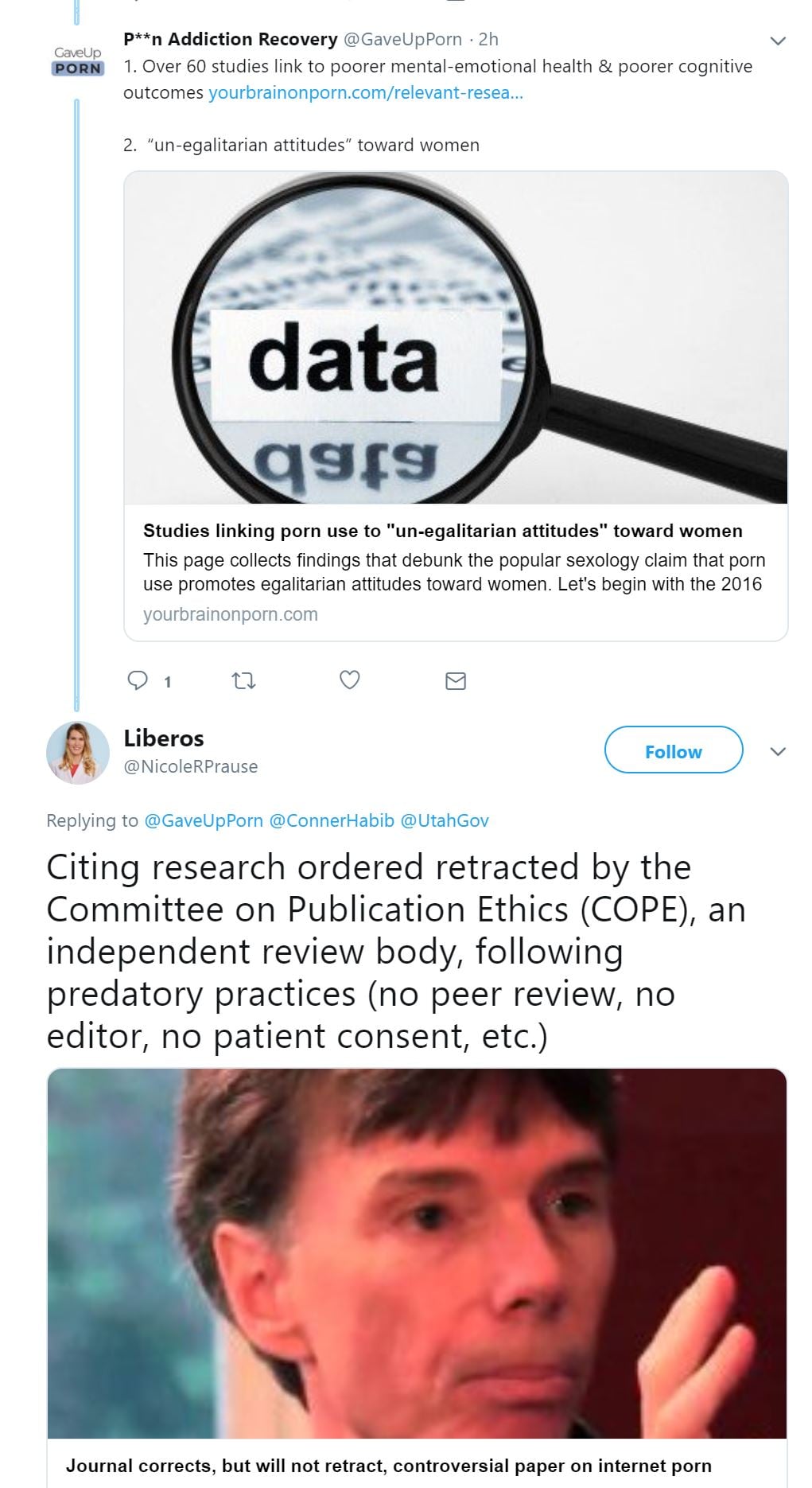
After a lengthy, thorough, time-consuming investigation, MDPI decided not to retract the paper, and circulated a draft editorial criticizing Prause’s unprofessional behavior. As soon as Prause was informed, she initiated an unprofessional, untruthful email exchange with MDPI, copying various bloggers she hoped would take her word for things and publish defamatory articles. Retraction Watch has already complied with her demand.
It’s 2019 and Prause continues to search twitter for unrelated material so she has an excuse to tweet her falsehoods and the bogus Retraction Watch article:
Tweet in response to two lists of studies from YBOP. Neither list contained Park et al., 2016.
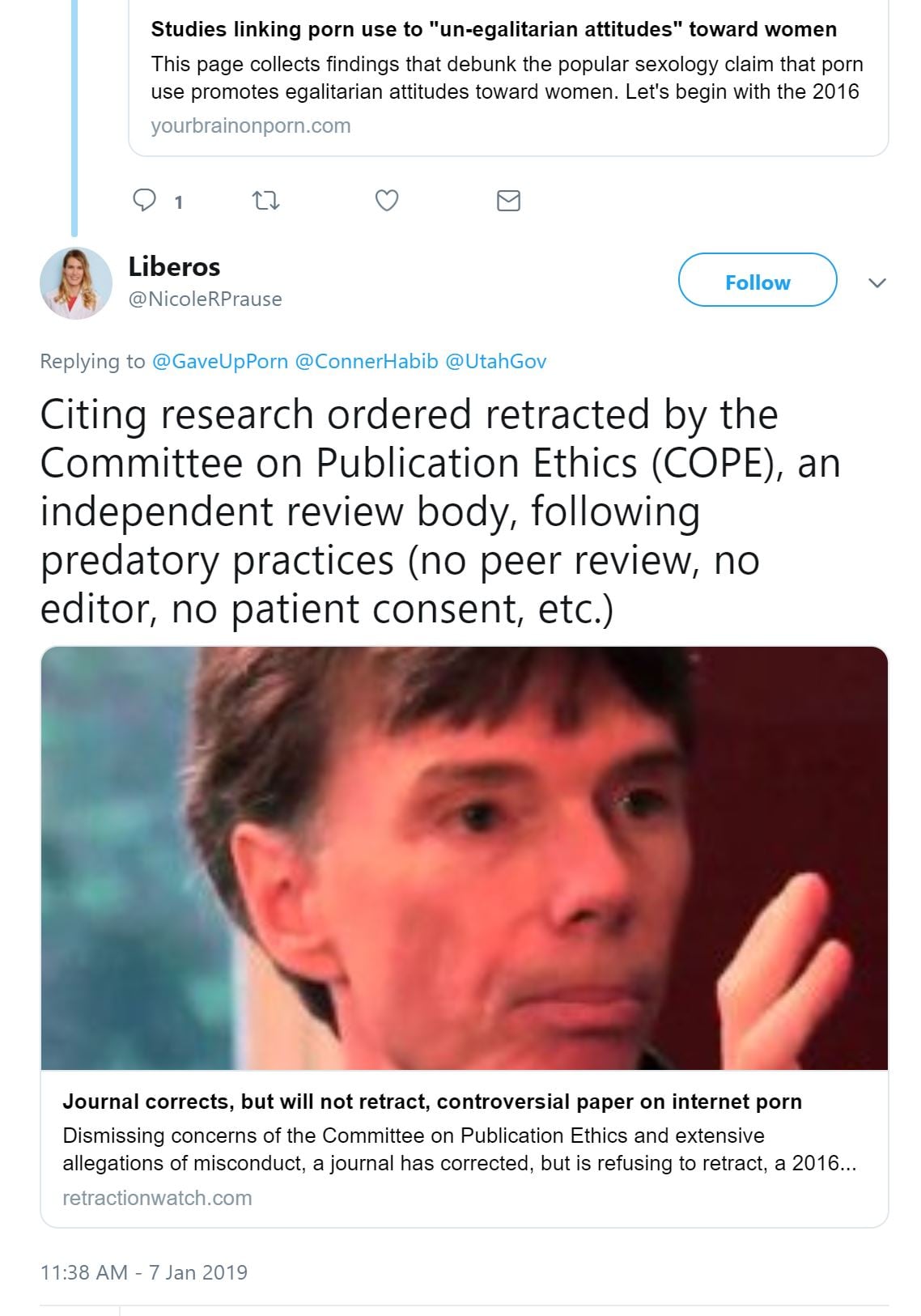
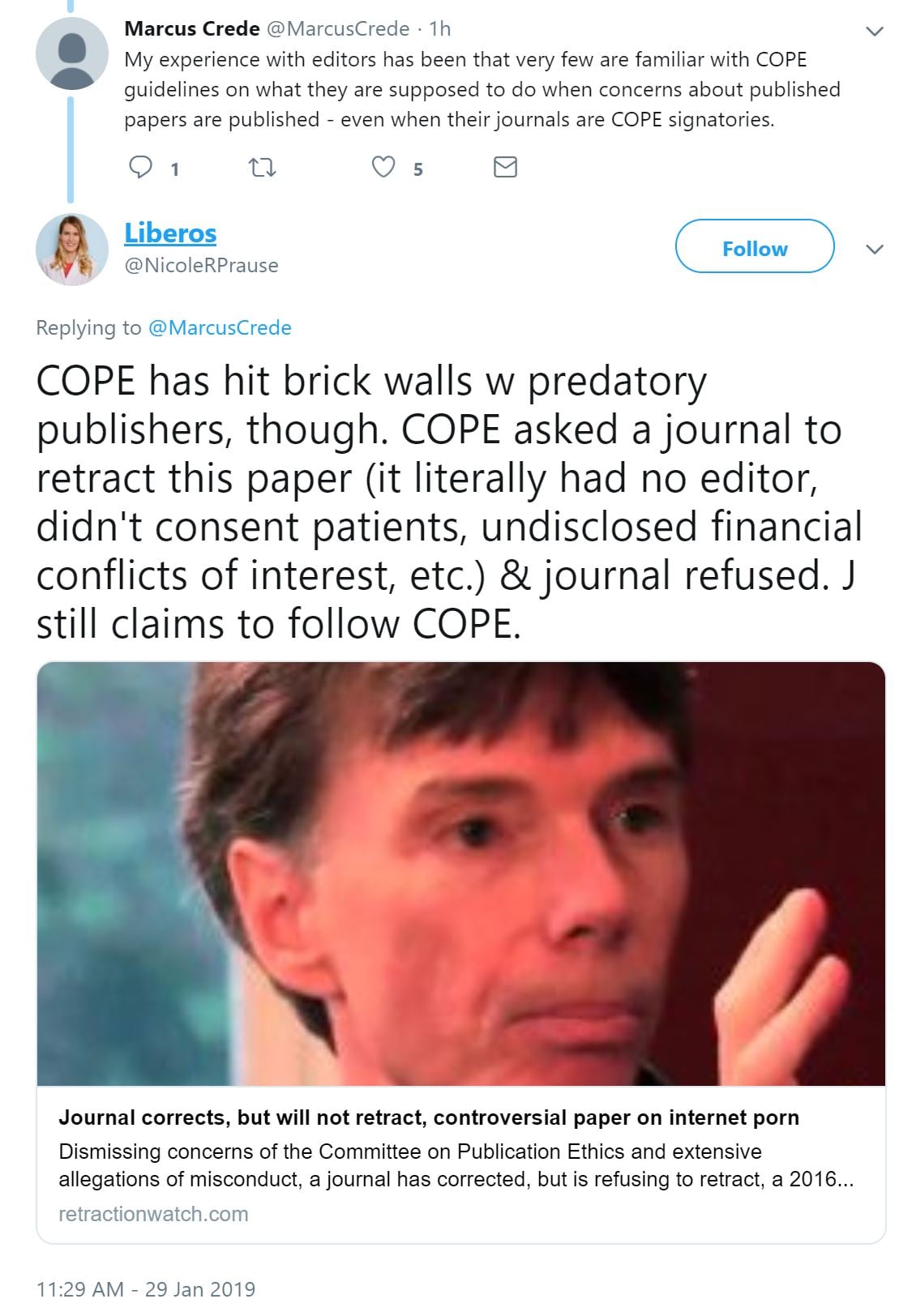
On February 16, 2019, a sexual medicine specialist presented a talk at the 21st Congress of the European Society for Sexual Medicine on the Internet’s impact on sexuality. A few slides describing porn-induced sexual problems, citing Park et al., 2016, were tweeted. The tweets caused Nicole Prause, David Ley, Joshua Grubbs and their allies to Twitter-rage on Park et al., 2016.
Several of Prause’s tweets allude to a keynote address by Gary Wilson scheduled for the 2018 ISSM conference. Suddenly and without explanation my talk was mysteriously cancelled. It seems likely that Dr. Prause was behind the cancellation as she is the only one to report (boast about?) the cancellation (repeatedly) on social media. She has a long history of making false reports to organizations and governing bodies.
It’s likely that Prause fed the ISSM conference organizers her usual collection of falsehoods. For example, I suspect she pointed out that I had been reported to the Oregon Board of Psychology (without cause) for “practicing psychology without a license.” I say this because, not long after the conference, I received a letter from the Board exonerating me of doing so (they could not reveal who had filed the malicious complaint).
Dr. Prause also regularly claims to people, including perhaps the conference organizers, that I hold myself out as a professor. This is also untrue. (See this link for details: Ongoing – Prause falsely claims that Wilson has misrepresented his credentials.) She may also have told the organizers her oft-repeated lies that I have a restraining order against me for her safety, and that I have been reported to the FBI. There is no such “no contact” order, and I have already made public a report from the FBI clearing me and confirming Prause as lying. Below are examples of Prause’s February 16, 2019 Twitter-rage related to Park et al., 2016:
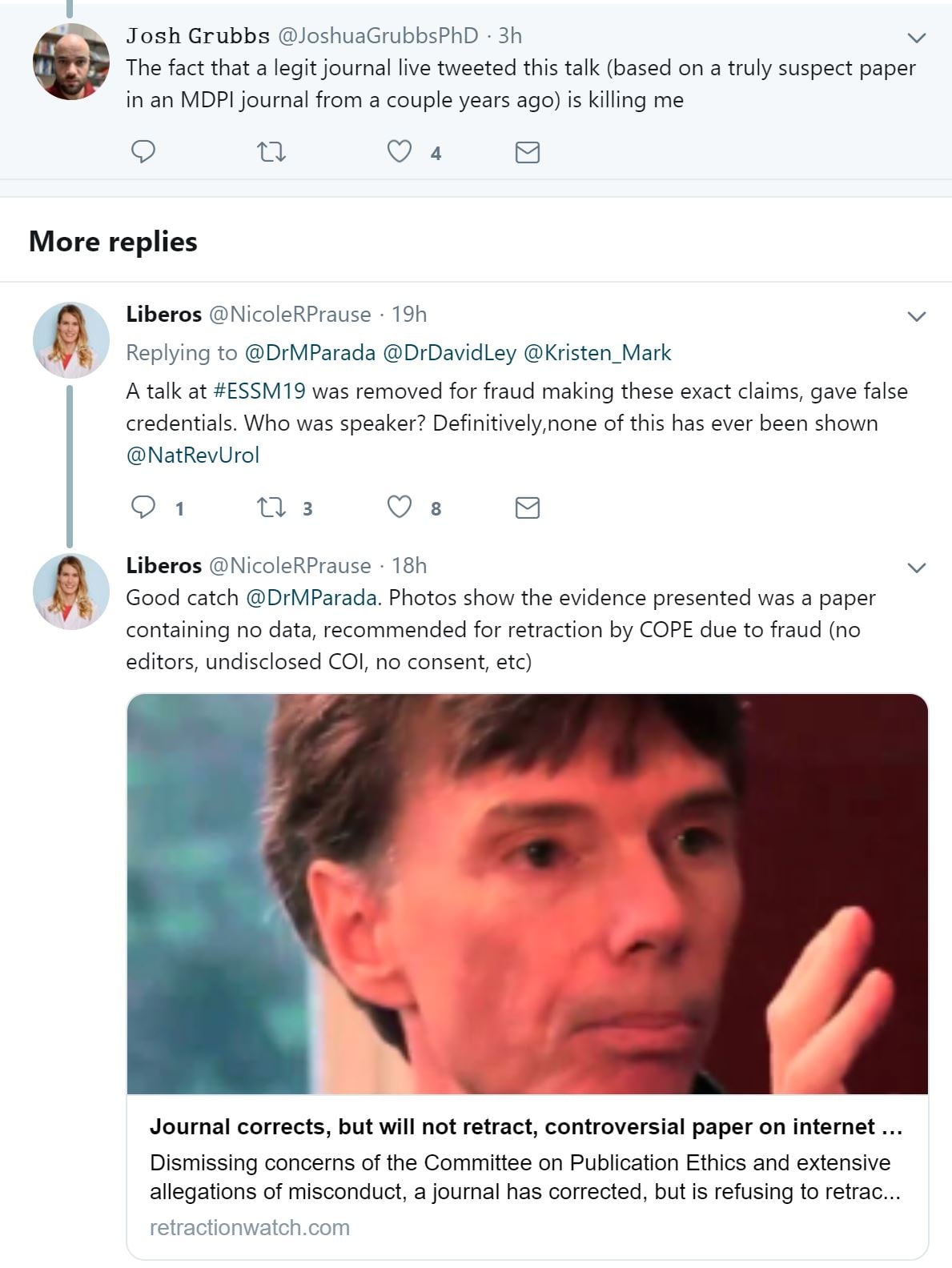
The same day, NatureReviewsUrology (NRU) quoted from the talk, not from our paper. This NRU tweet is the one that drew the most Twitter rage from Pause and her followers attacking our paper, even though our paper did not say the following, and really said nothing about porn addiction. As an aside, Prause’s claims about “falsified data” are untrue and unsupported.
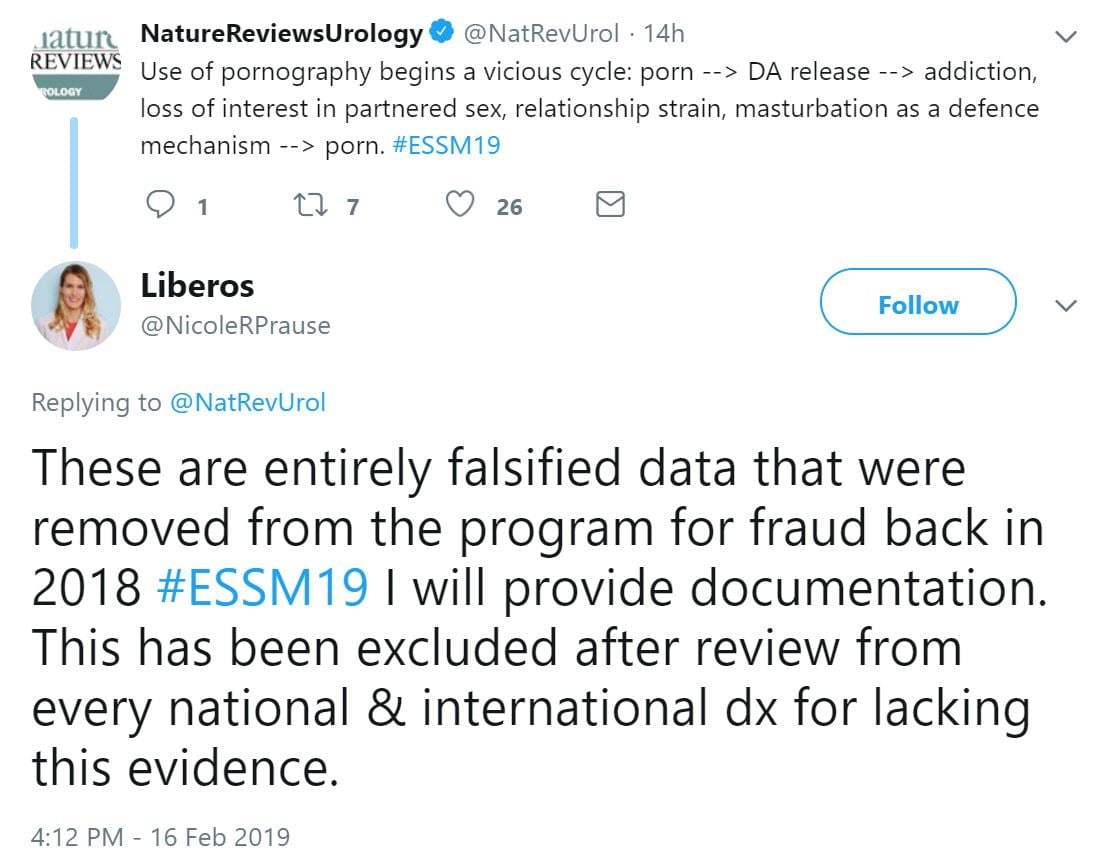
There is no documentation of anything, other than Prause’s endless string of unsupported, defamatory claims, chronicled on these 3 pages:
- Nicole Prause’s Unethical Harassment and Defamation of Gary Wilson & Others
- Nicole Prause’s Unethical Harassment and Defamation of Gary Wilson & Others (page 2)
- Libelous Claim that Gary Wilson Was Fired (March, 2018)
The truth is, I was most likely uninvited as a keynote speaker by the ISSM due to the behind-the-scenes efforts of Prause and her chum and co-author Jim Pfaus (ISSM member), who used his long-time influence to put the screws to the ISSM committee. As I engaged in none of the accused wrongdoings, Prause clearly fabricated some crazy lies to scare the ISSM off (in keeping with her pattern of behavior documented on this page). A screenshot of Gary Wilson’s scheduled talk at the 2018 ISSM conference held in Portugal:
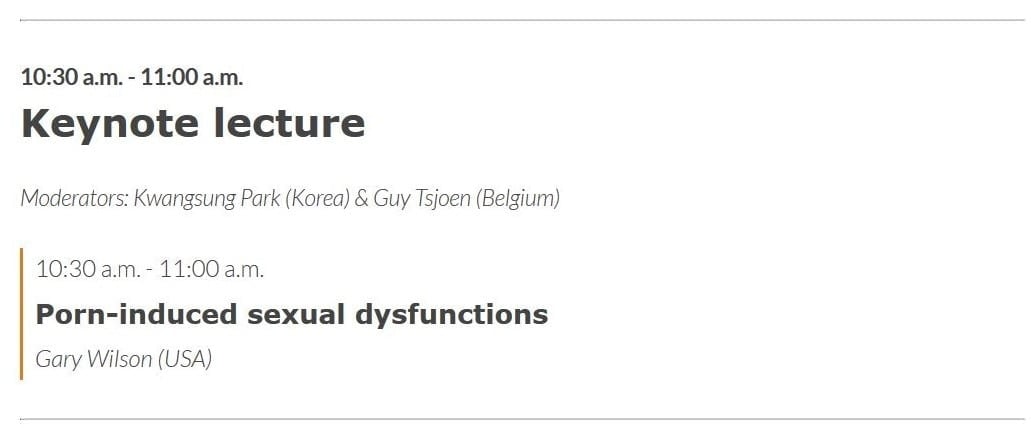
The committee asked me to speak because: (1) I was on Park et al., 2016, and, (2) I had given a very popular TEDx talk, which touched on porn-induced ED. A screenshot of the formal invitation:
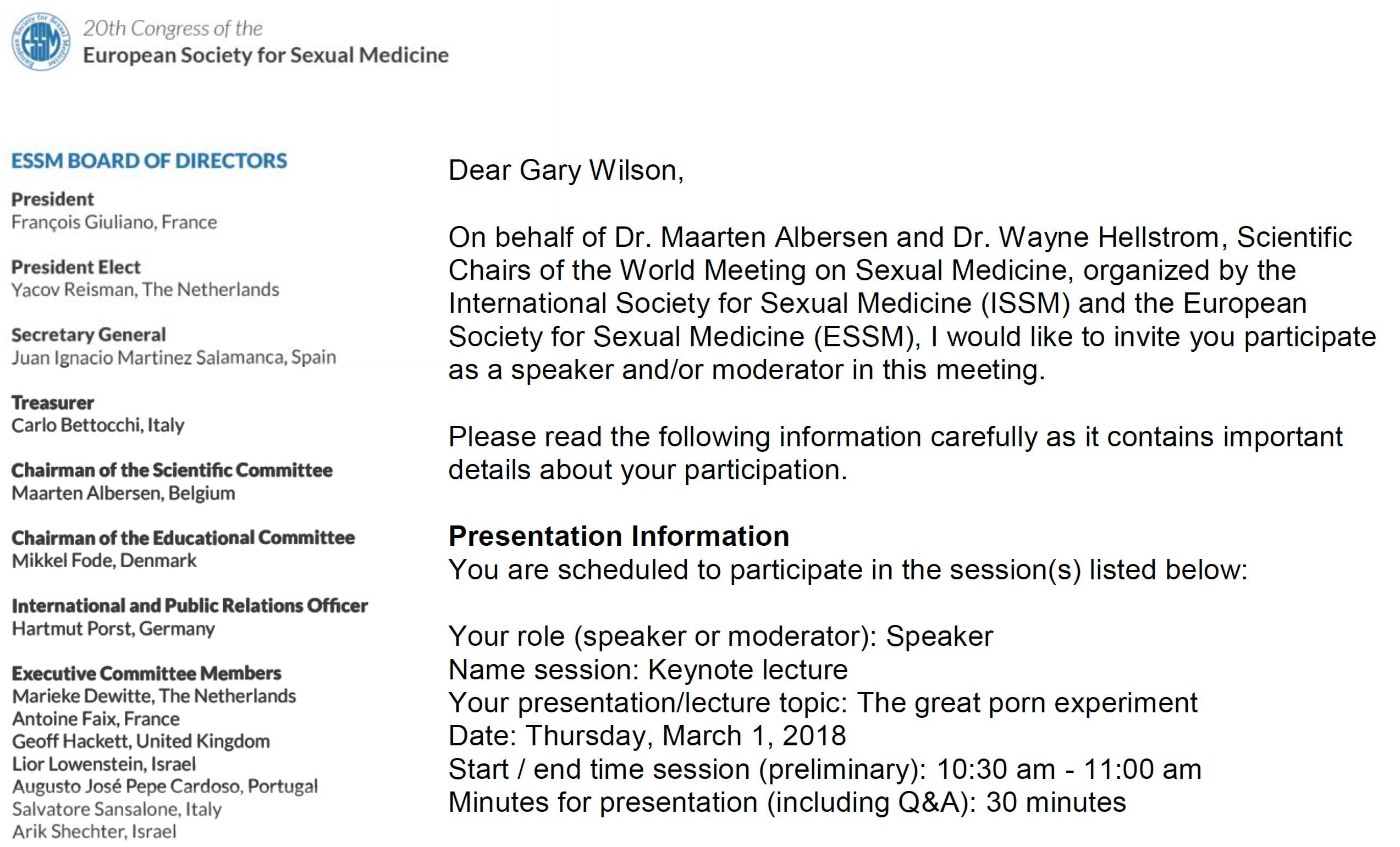
On social media, Prause has stated that she got my talk cancelled because I presented “fake credentials.” For example, Prause’s tweet attacking the ESSM talk, and her claiming that Gary Wilson was uninvited because he “gave false credentials”:
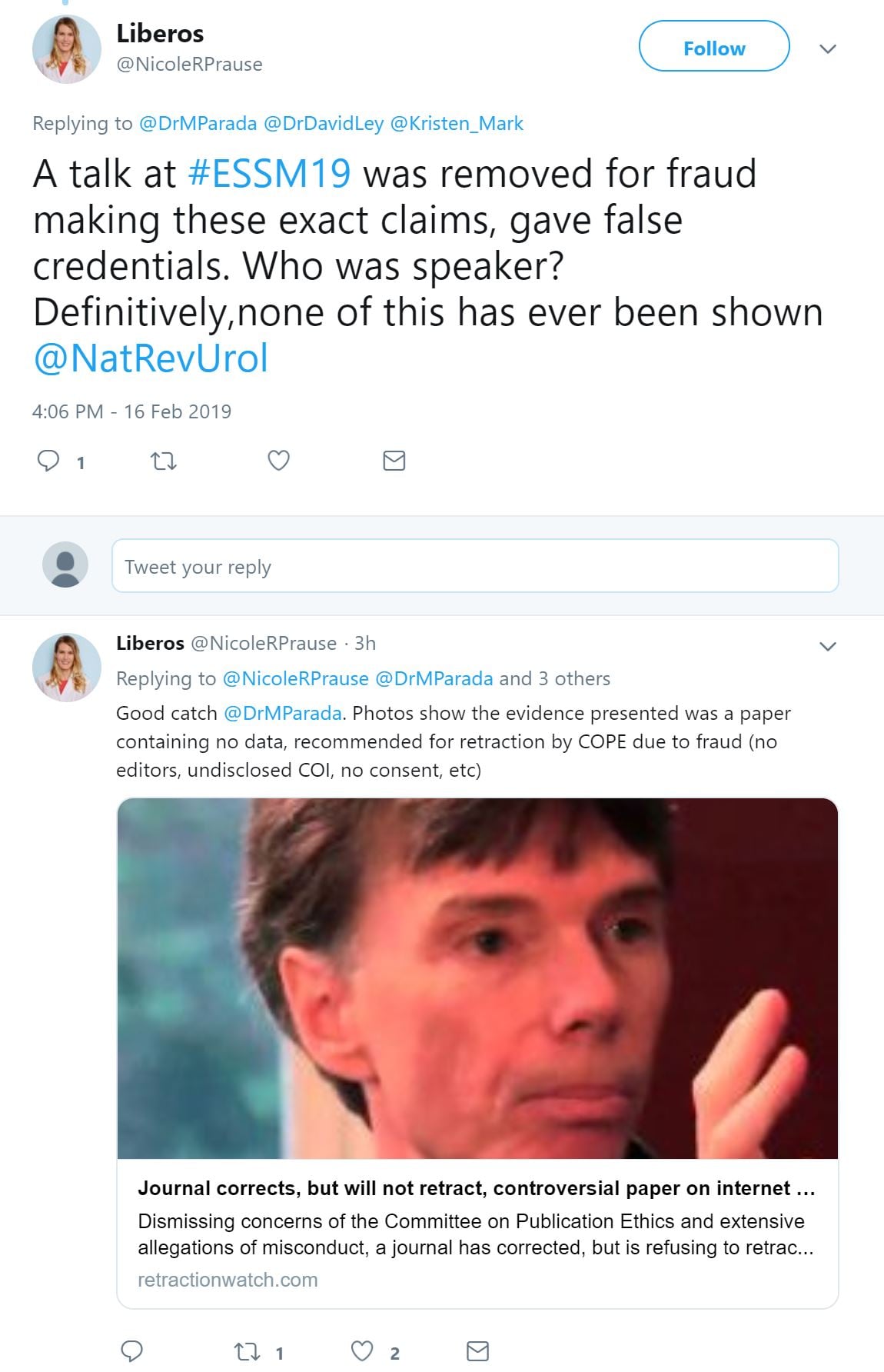
Proof that Prause is lying: in back and forth emails, I reminded the ISSM committee that I did not have a PhD or MD (see below). Still, the committee insisted I present and even paid for my flight to Portugal despite the cancellation (which was not normally done).
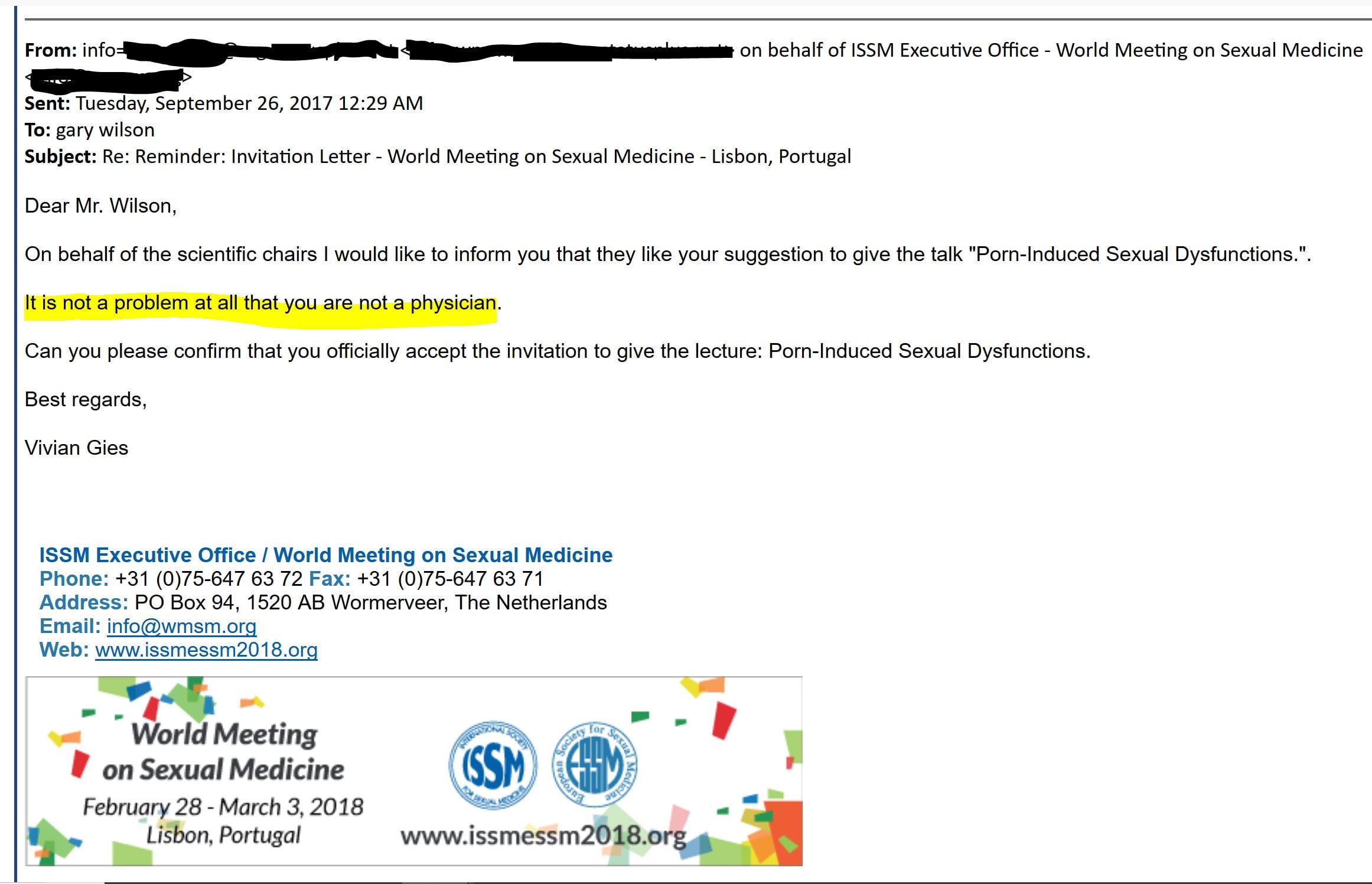
While it may be shocking that Prause would engage in such skulduggery, we must keep in mind that this is the same person who reported the 7 medical doctors on Park et al. to their state medical boards (the boards ignored Prause’s targeted harassment). She’s the same person who has falsely stated for 6 years that she has reported Gary Wilson to the FBI. The same person who repeatedly, falsely tweets that Fight The New Drug told its followers that “Dr. Prause should be raped”. The same person who attacked and libeled former UCLA colleague Rory C. Reid PhD. The same person who published an article on a porn site, falsely claiming that Gary Wilson was fired from Southern Oregon University. And on and on it goes.
More tweets attacking the 2019 ESSM talk and Park et al., 2016:
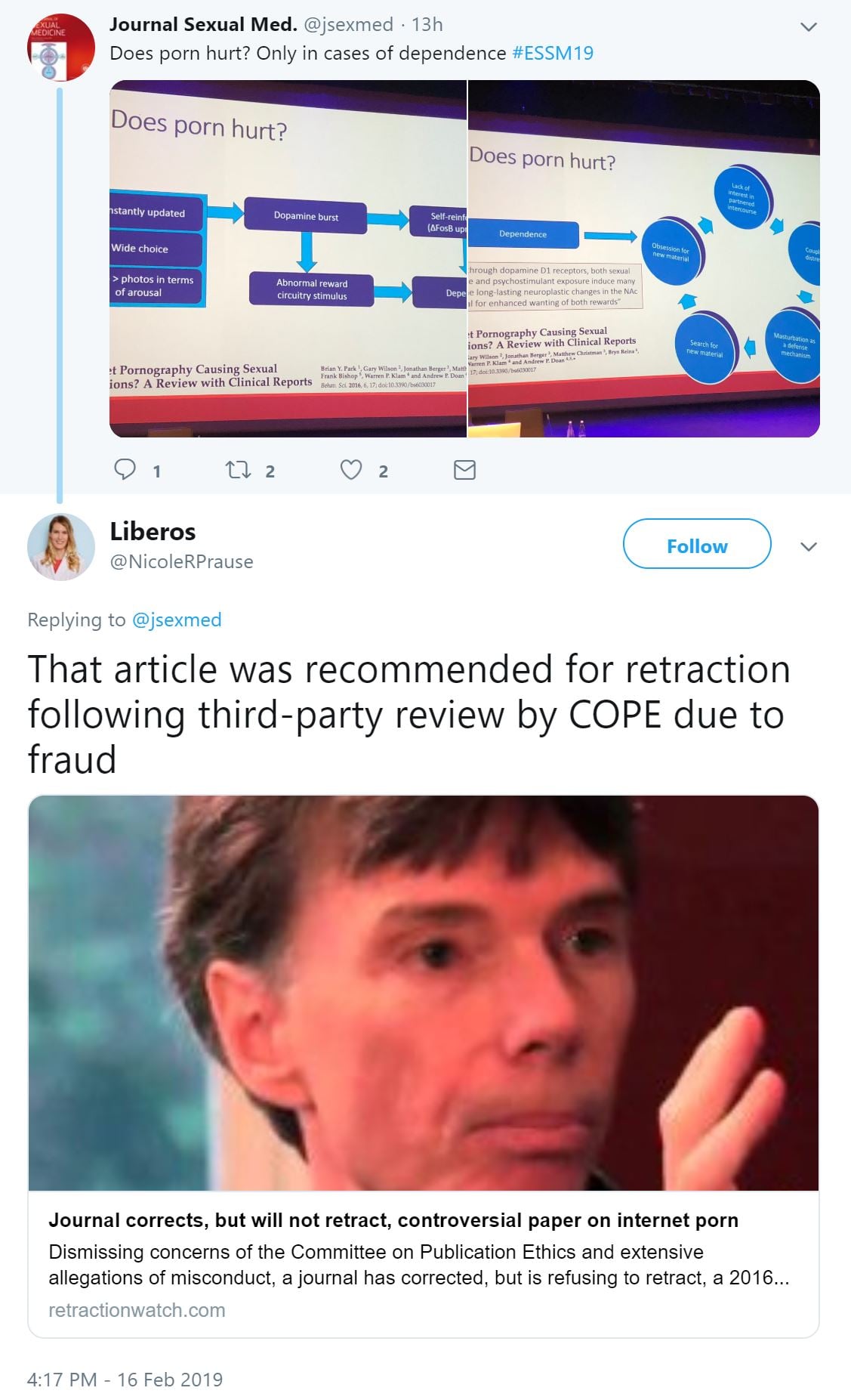
No, COPE did not suggest retraction, even though Prause harassed them for 3 straight years. As soon as COPE understood that all Navy consent rules had been complied with, all talk of retraction ended.
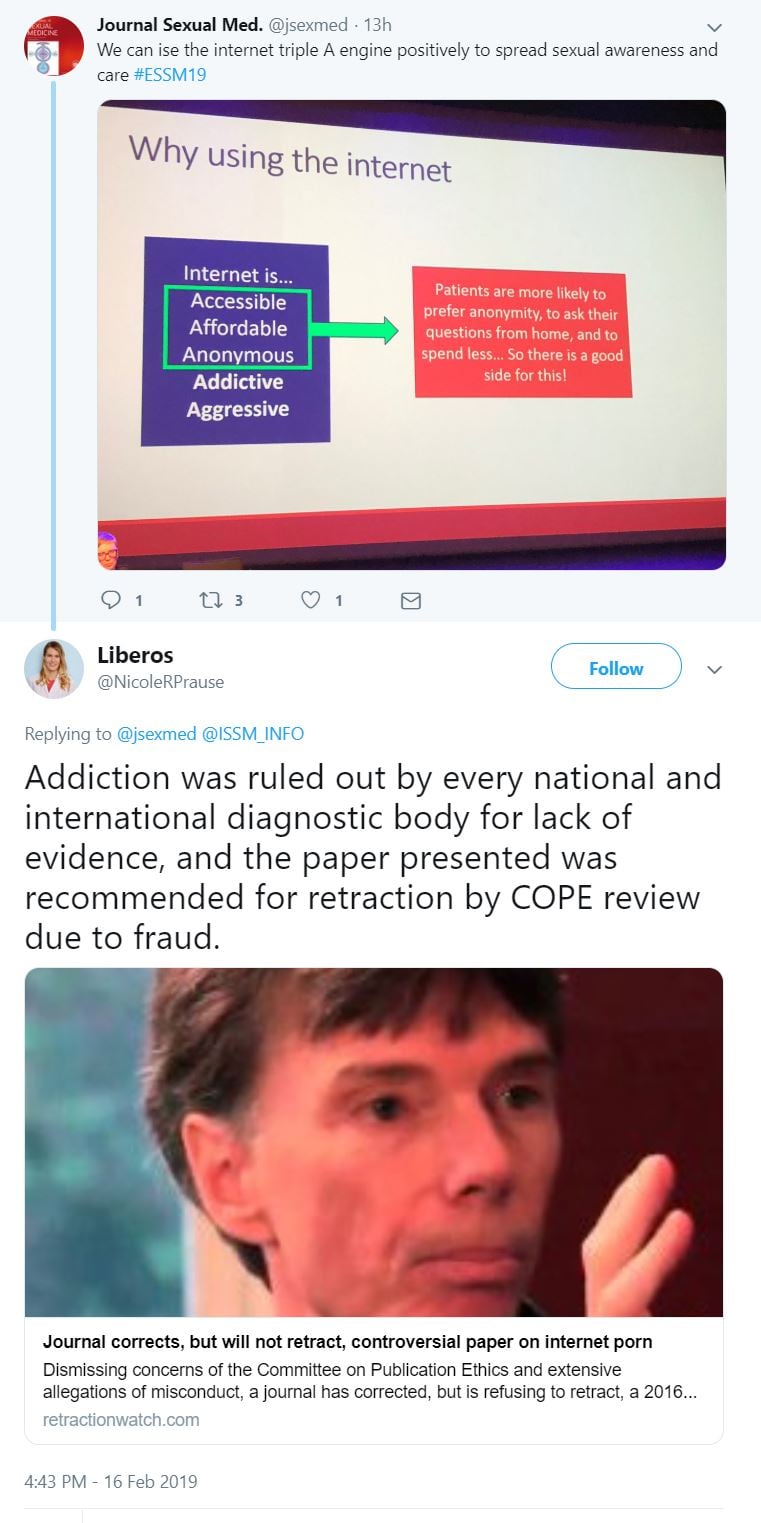
Another falsehood about “addiction being ruled out.” Diagnostic manuals such as the DSM and ICD do not use the word “addiction” to describe any addiction: they use “disorder.” In reality, the latest version of the World Health Organization’s medical diagnostic manual, The International Classification of Diseases (ICD-11), contains a new diagnosis suitable for diagnosing what is commonly referred to as ‘porn addiction’ or ‘sex addiction.’ It’s called “Compulsive Sexual Behavior Disorder” (CSBD).
The first section of this extensive critique expose Prause’s falsehoods surrounding the ICD-11: Debunking “Why Are We Still So Worried About Watching Porn?”, by Marty Klein, Taylor Kohut, and Nicole Prause (2018). For an accurate account of the ICD-11’s new diagnosis, see this recent article by The Society for the Advancement of Sexual Health (SASH): “Compulsive Sexual Behaviour” has been classified by World Health Organization as Mental Health Disorder.
More trolling of the 2019ESSM talk:
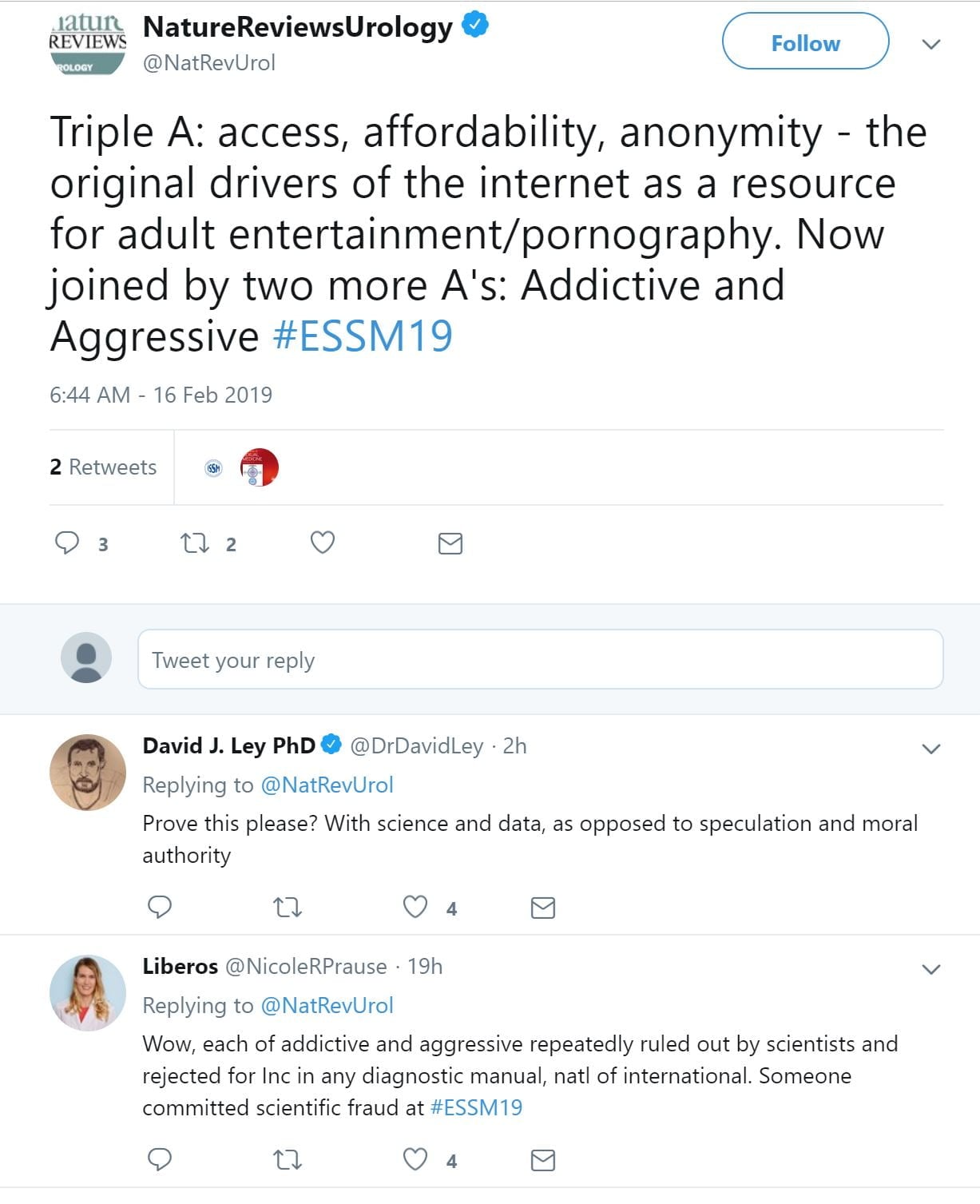
Prause and Ley – as always, loudly defending porn and the porn industry.
For no particular reason, Prause tweets the bogus RetractionWatch article again (3-1-19):

Prause continues, defaming the journal Behavioral Sciences:
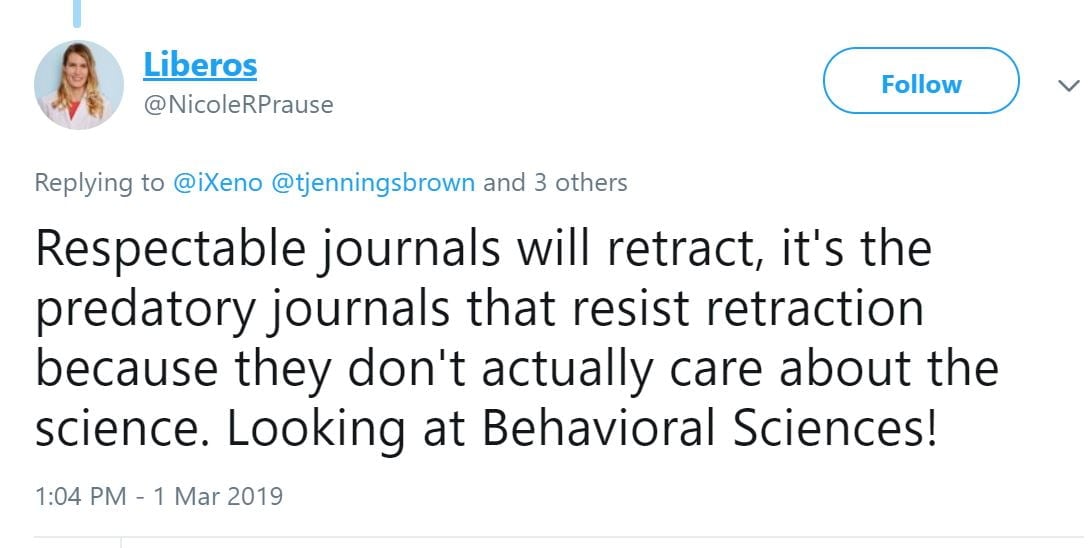
Cyber- harassment.
Out of the blue, Prause tweets an attack on MDPI: The following downgraded rating by Norwegian Register was a clerical error, that was later corrected. See the explanation of the MDPI Wikipedia page: https://en.wikipedia.org/wiki/Talk:MDPI#Reply_1-APR-2019
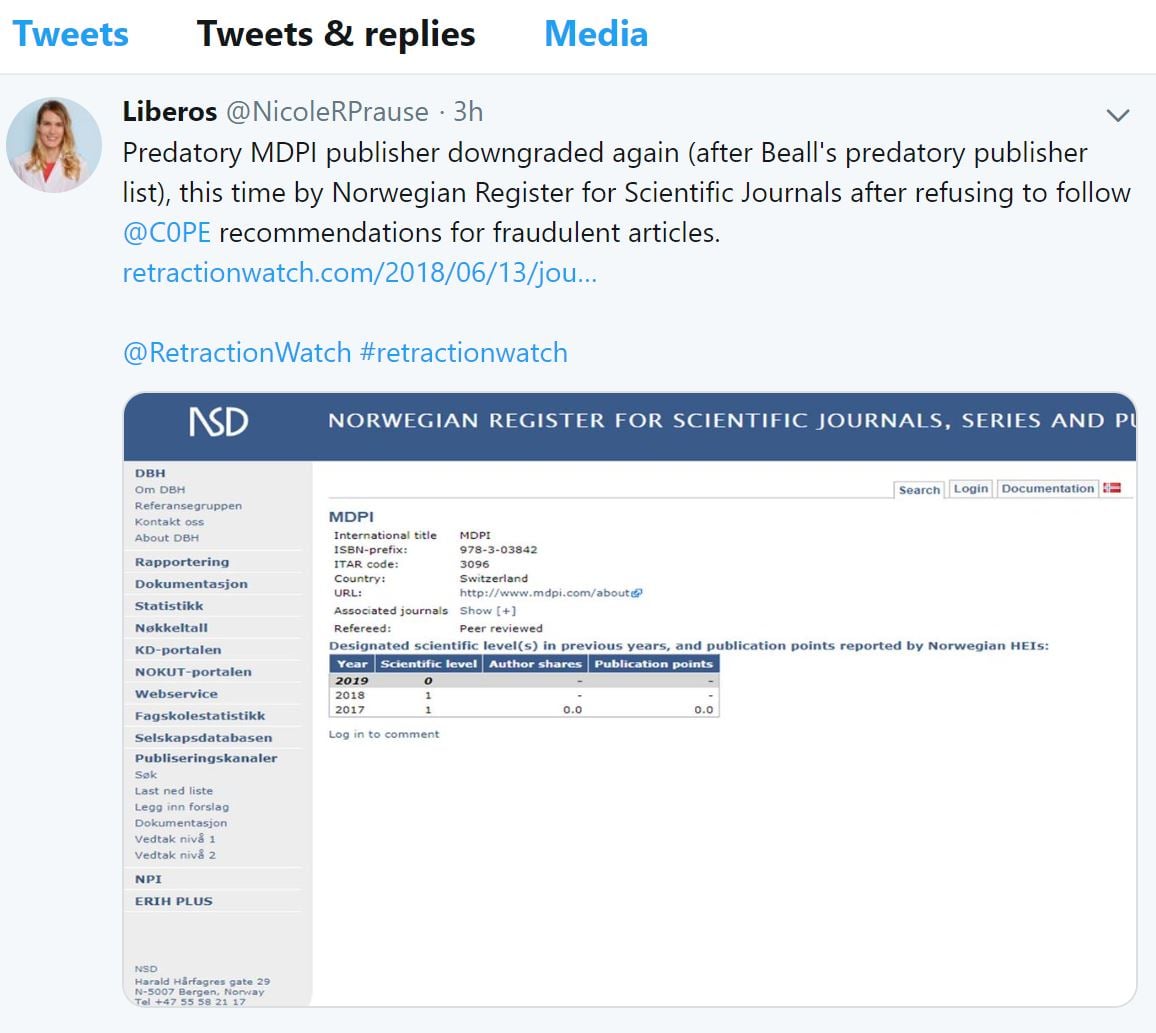
Prause knows the truth as several of her fake aliases have edited the MDPI Wikipedia page, inserting her usual set of lies.
A link to the corrected version showing that MDPI was not downgraded. That’s why Prause did not link to the page in her tweet. Screenshot below:
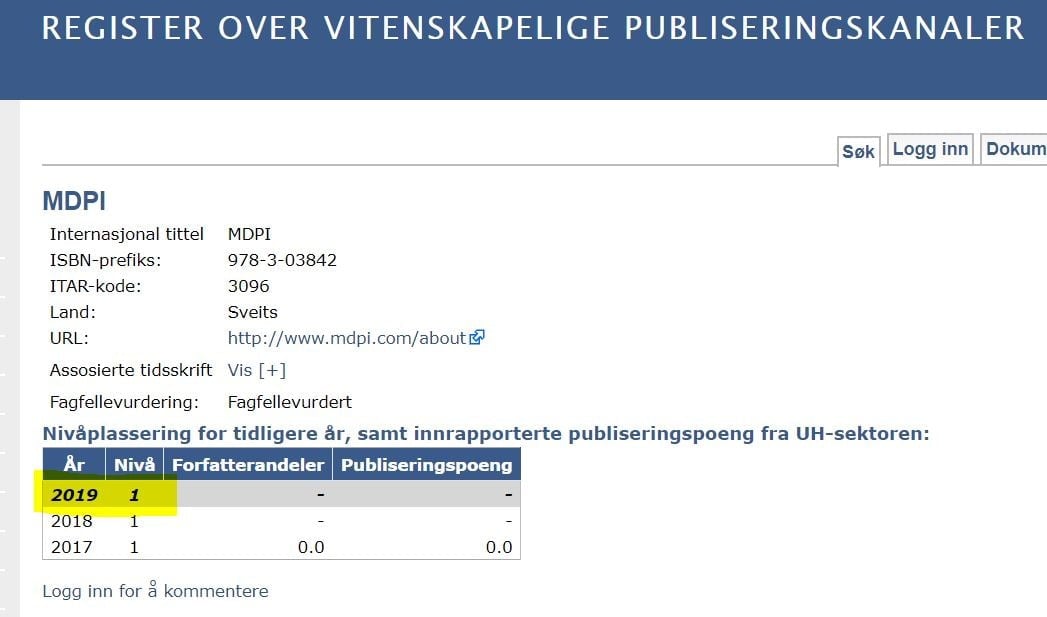
Two days later Prause trolls an old twitter thread were Gary Wilson was correcting Josh Grubbs spin. She tweets the same debunked screenshot:
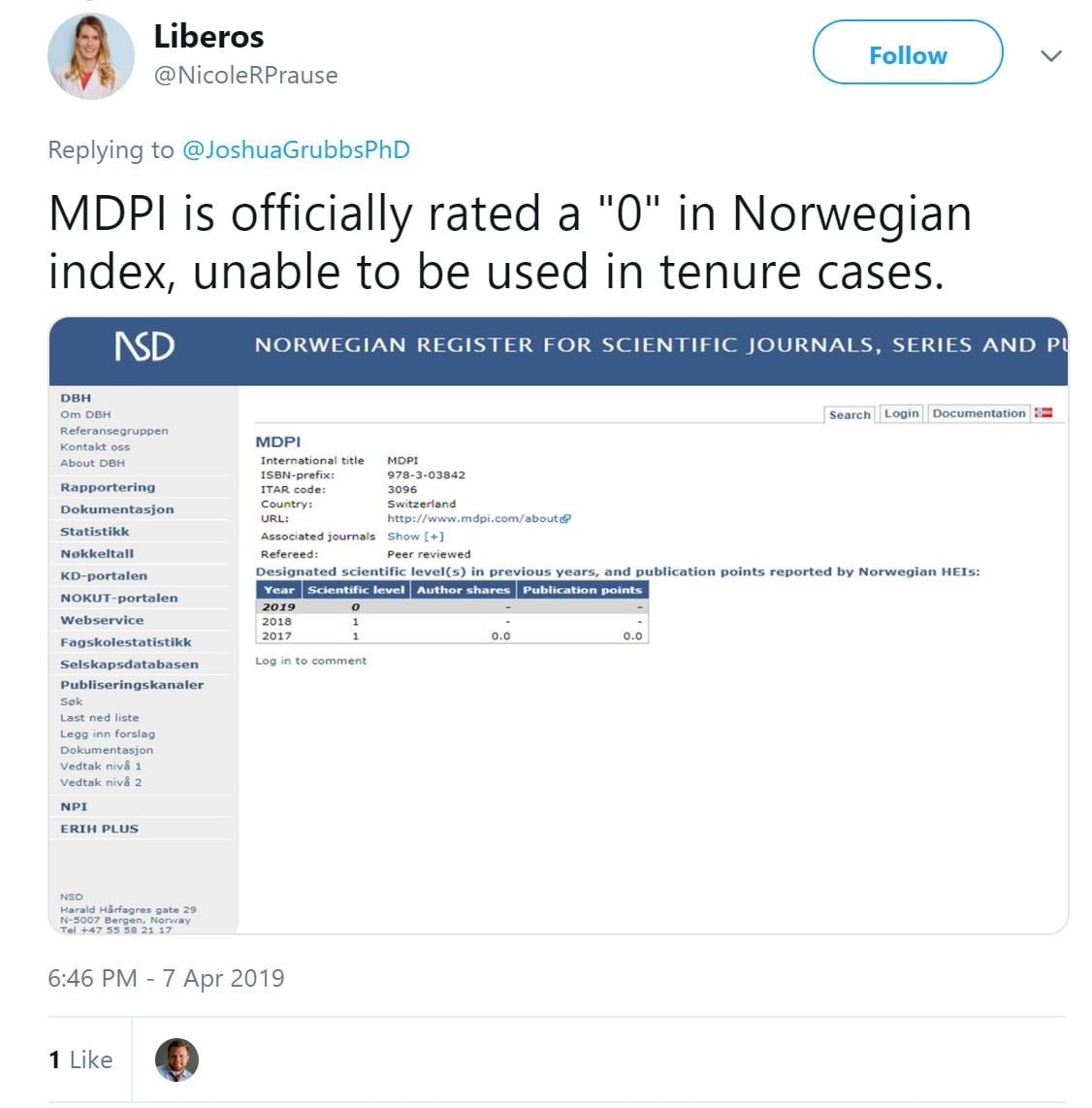
This marks 4 years of obsessive cyber-harassment and defamation.
April, 2019, David Ley joins Nikky in disparaging Park et al., 2016:
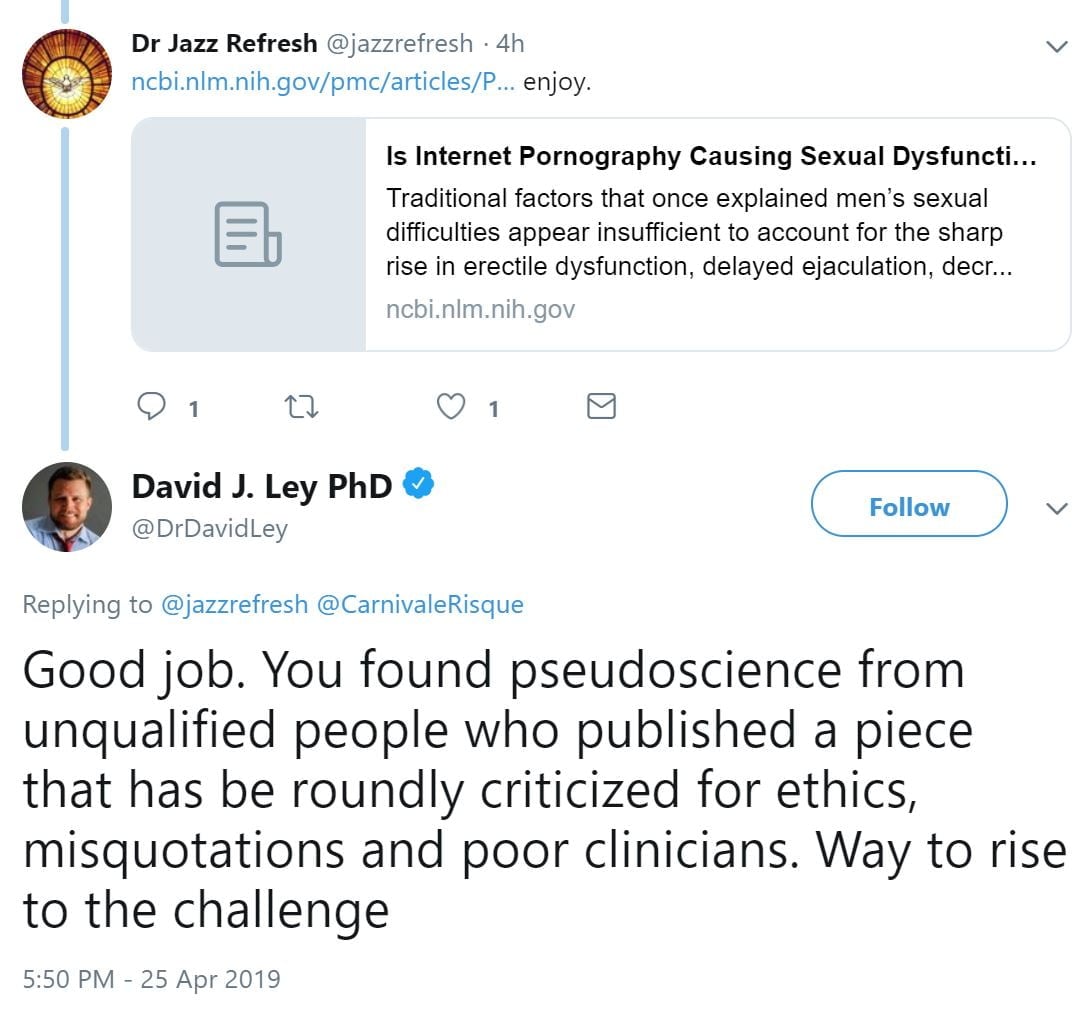
Ley never responds with substance to back up his falsehoods.
April 27, 2019. Trolling a random thread for an excuse to spread usual falsehoods:
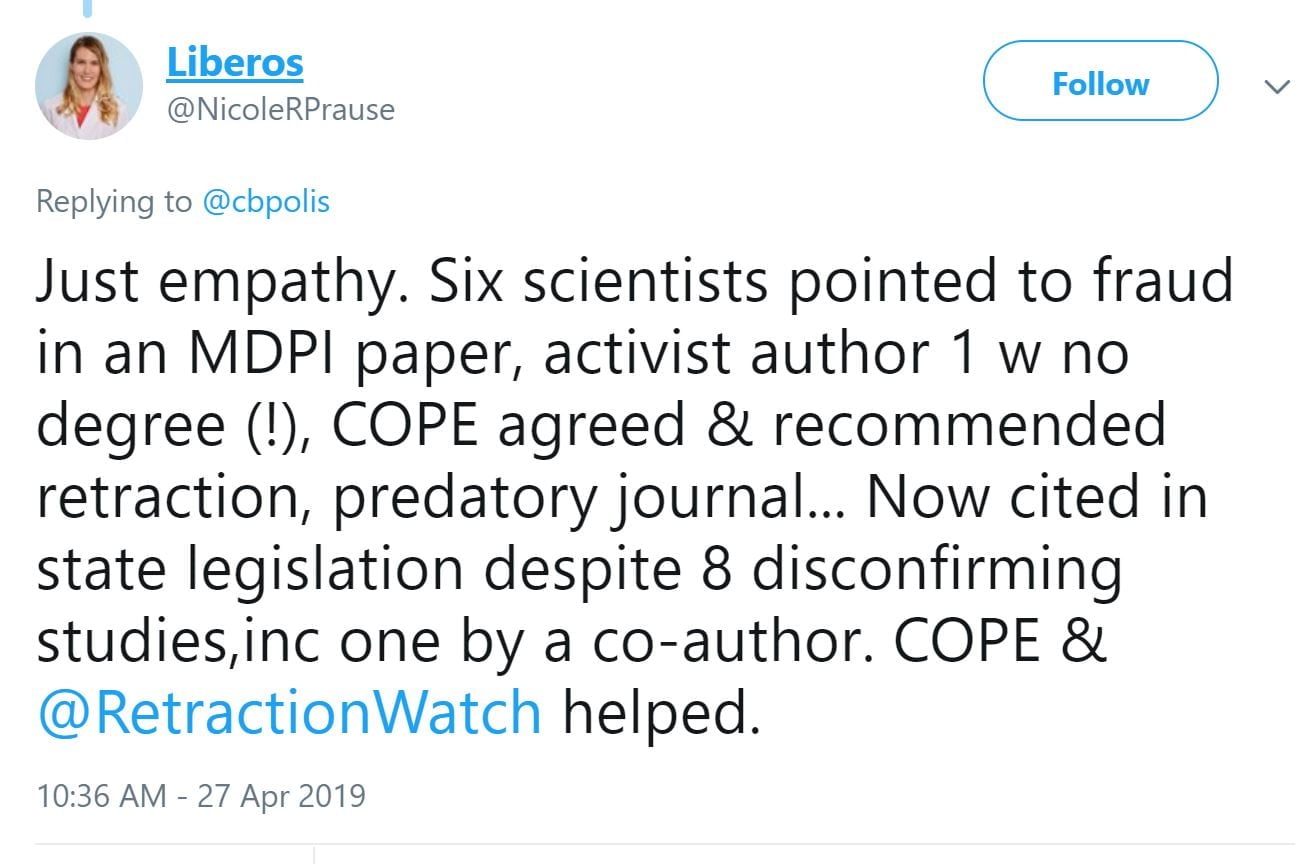
As stated there was only one ‘scientist”, Prause. And no, there are not 8 dis-confirming studies.
————
July, 2019 – She tunes up again tweeting, as a Wikipedia likely Prause sockpuppet inserts this same information into the MDPI Wikipedia.
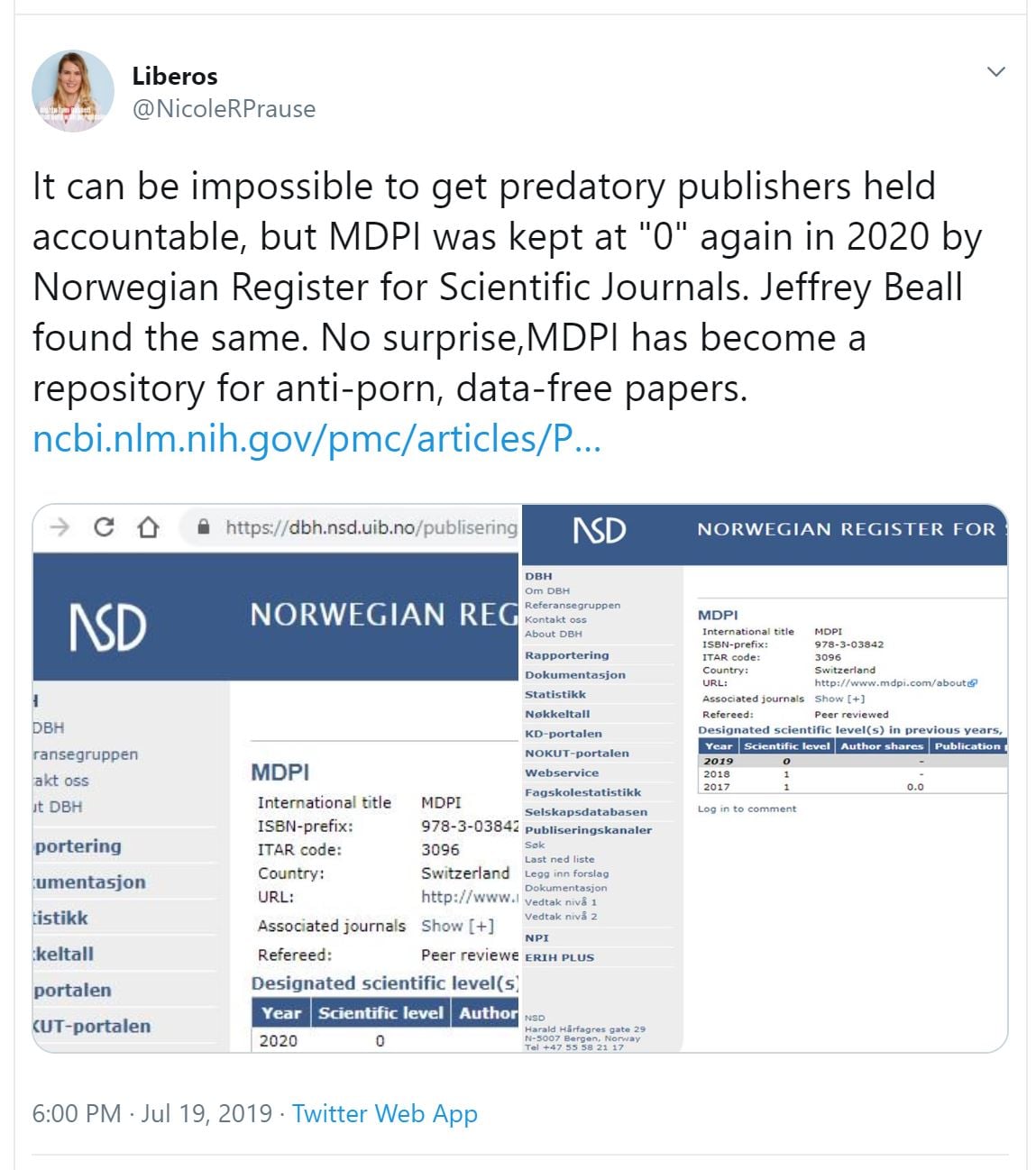
A link to the corrected version showing that MDPI was not downgraded in 2019 (it was clerical error that was eventually corrected). While the 2020 rating may also be an error, the Norwegian register does show “0’ – but it’s “not again”. Notice that Prause is attempting to fool the public by tweeting 2 screenshots of the ratings; one with only 2020, and a screenshot of the 2019 error that was later corrected. Prause’s screenshots:
First showing only 2020
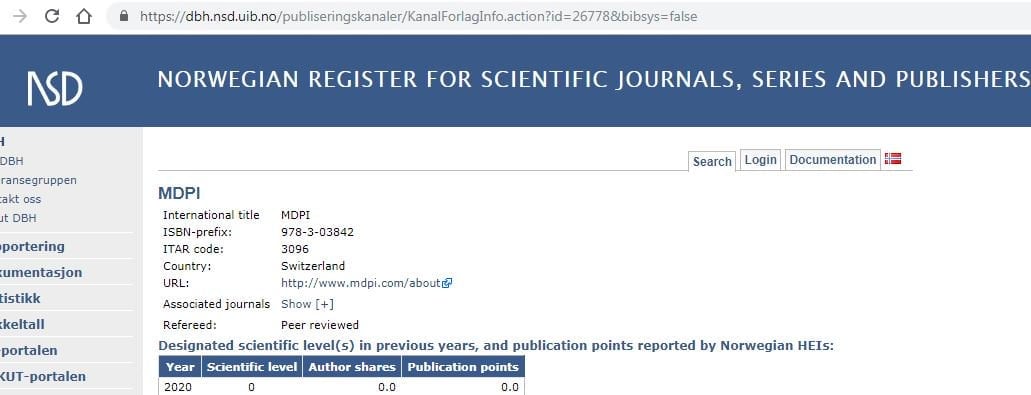
Second showing the uncorrected error:
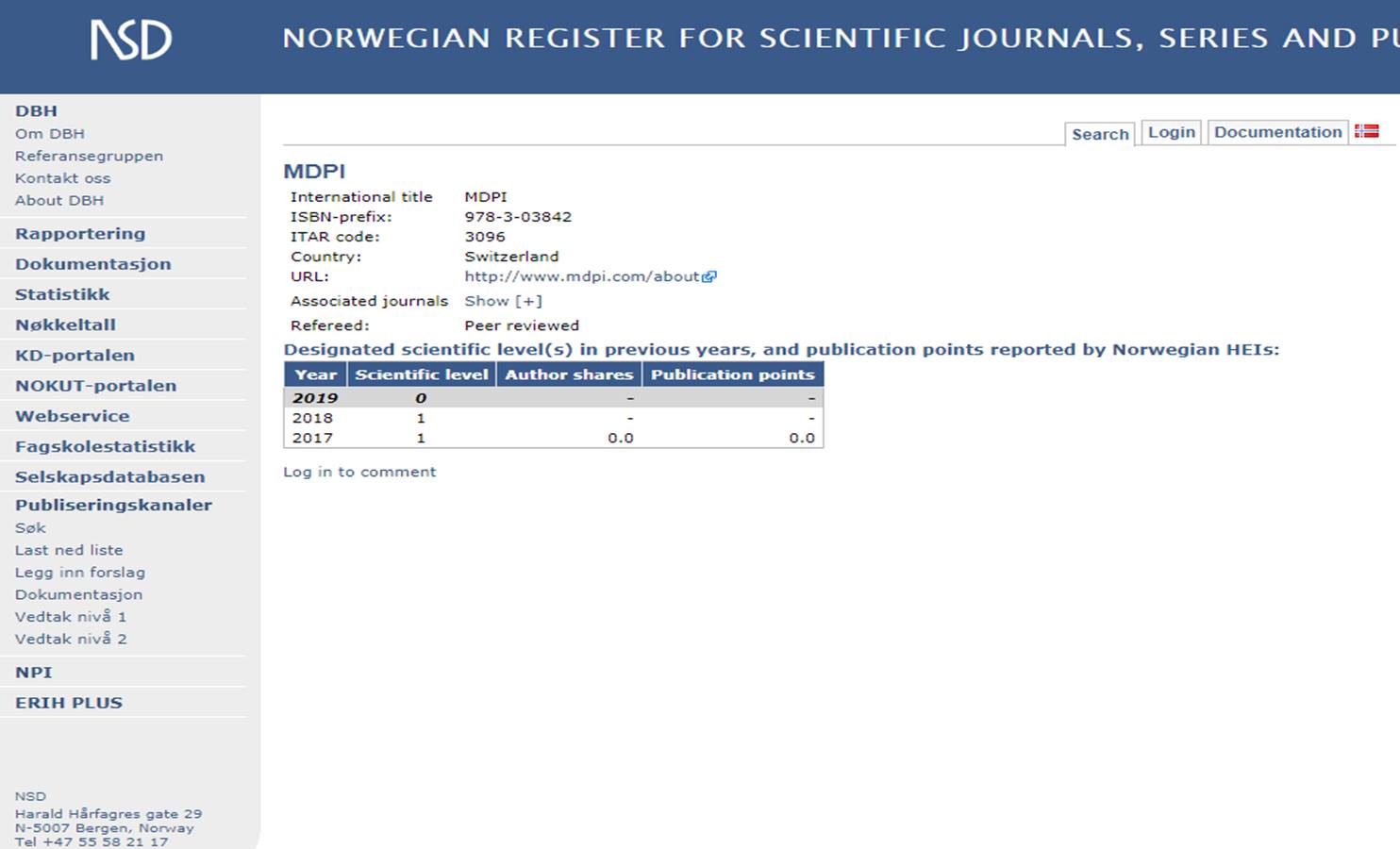
Prause is lying about MDPI’s 2019 rating, as seen in a screenshot of the recent ratings:
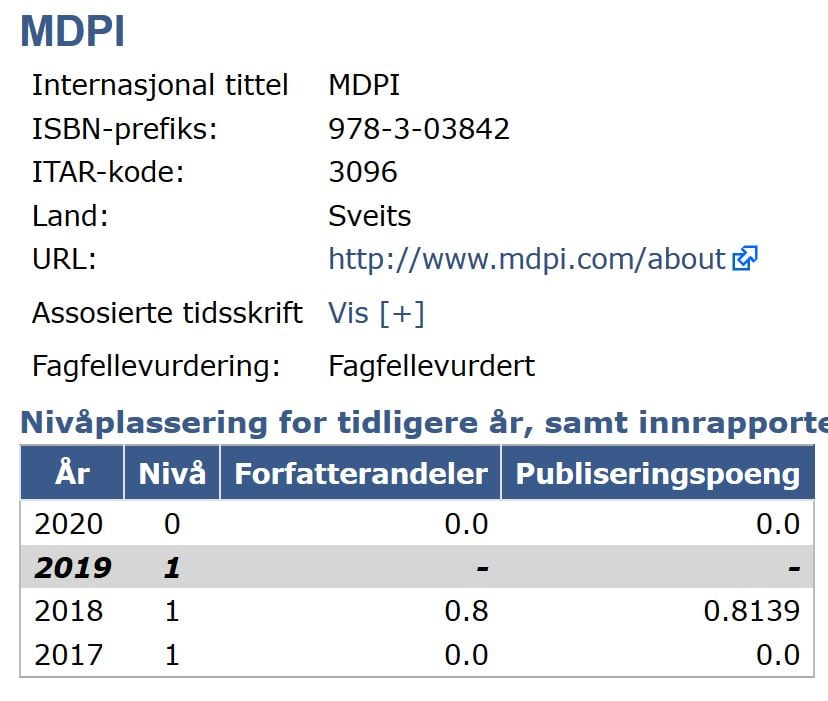
Concurrently with Prause’s deceptive tweet a “new” Wikipedia alias inserts the 2020 rating into the Wikipedia page.
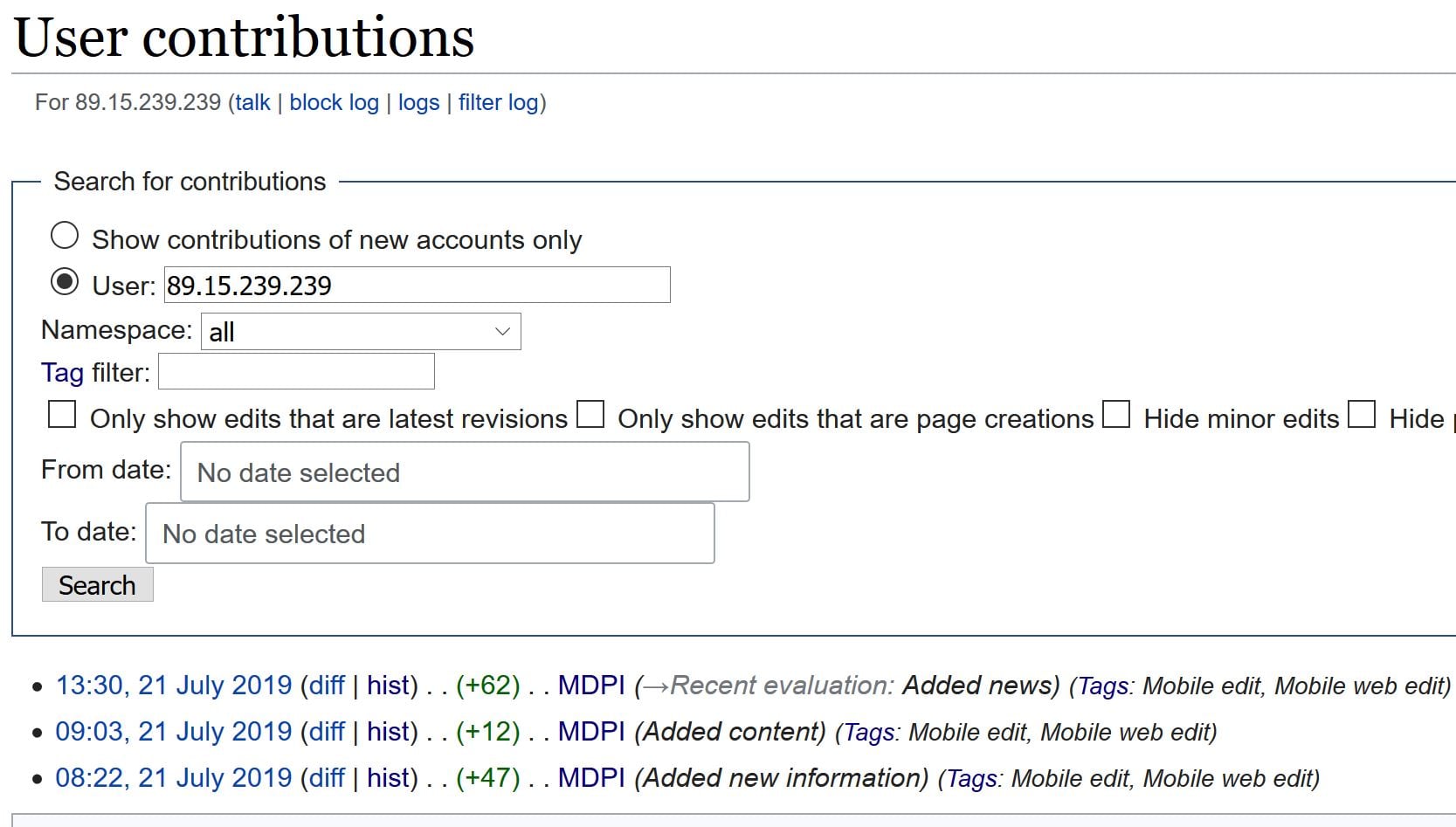
Franck Vazquez, Ph.D. (Chief Scientific Officer of MDPI) calls Prause out for lying:
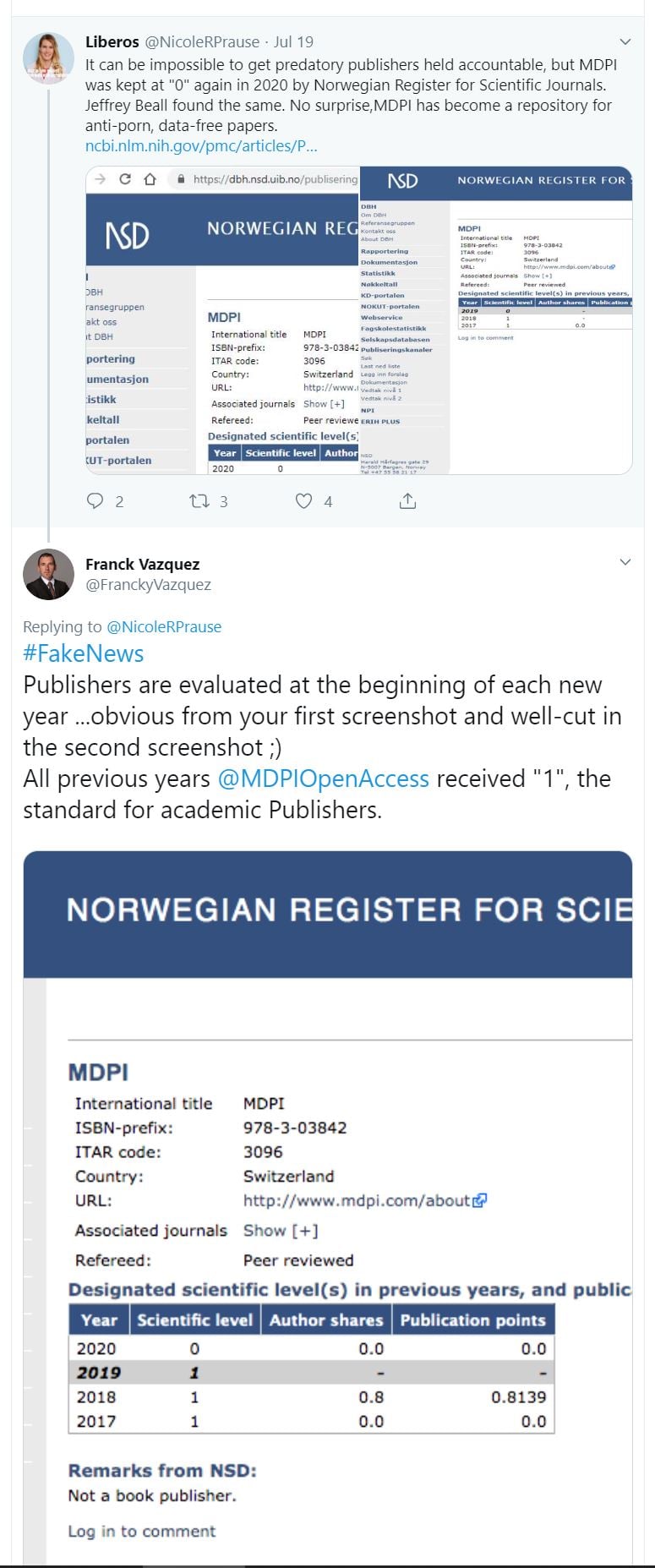
It appears that the 2020 rating will be adjusted at the beginning of the year.
In response, Prause trolls a 3-month old Frank Vasquez tweet:
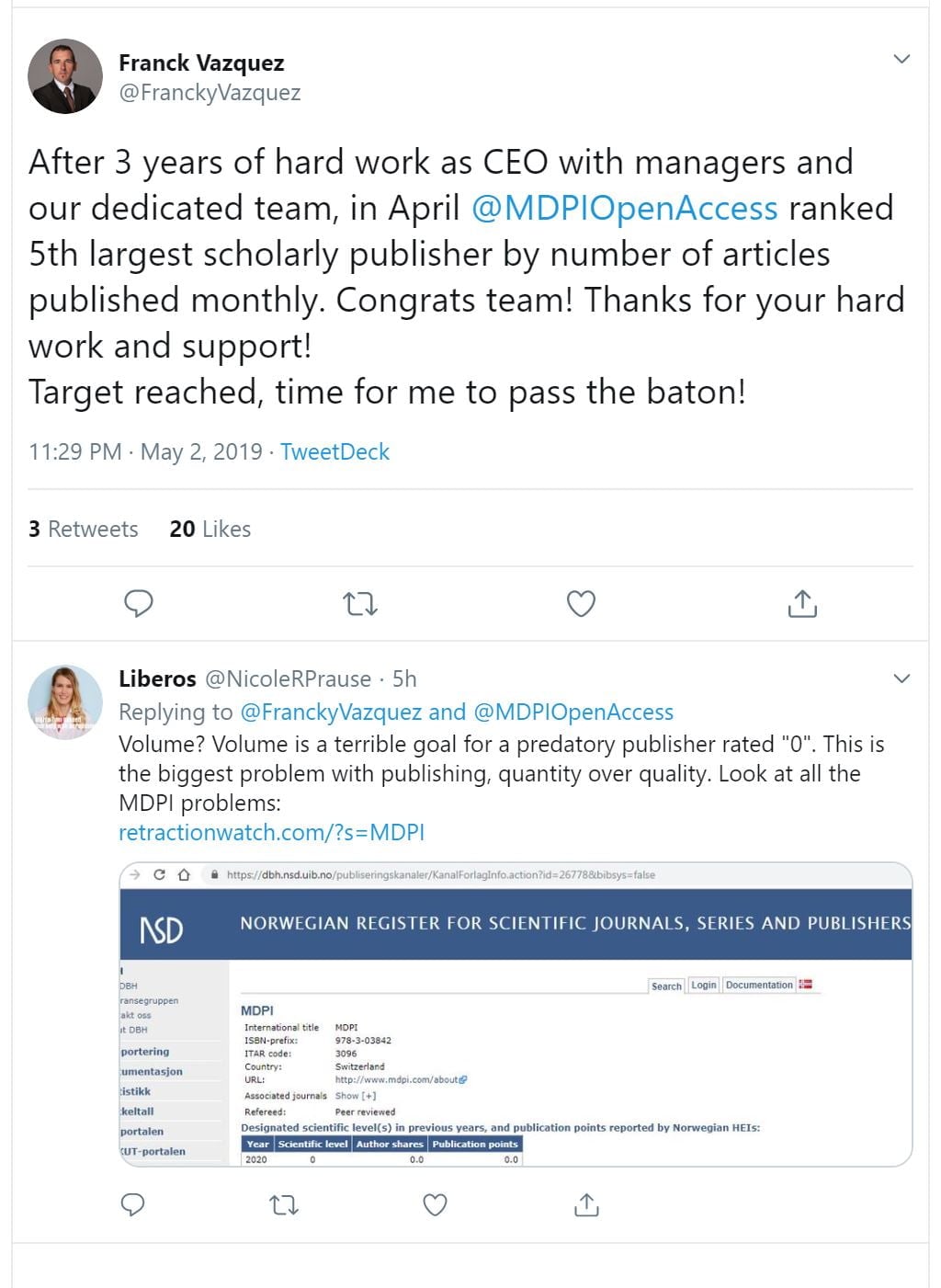
————————
August, 2019: Prause and David Ley team up to lie about Park et al., 2016. The paper is posted in a thread were Ley misrepresents the state research, claiming porn addiction doesn’t exist. Immediately Ley responds with defamation – claiming the authors paid to have Park et al., 2016 published:
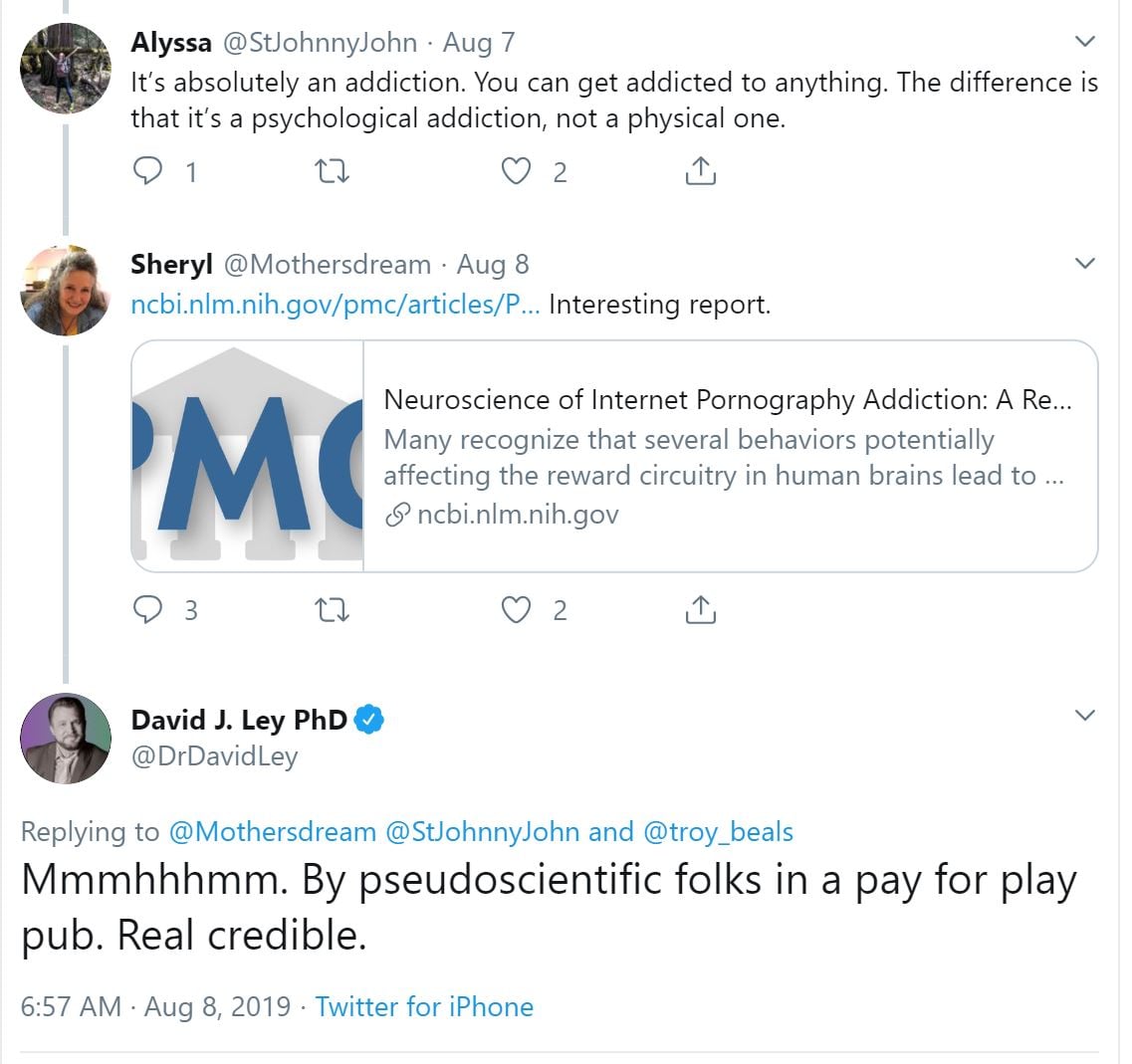
Gary Wilson corrects Ley’s falsehoods:
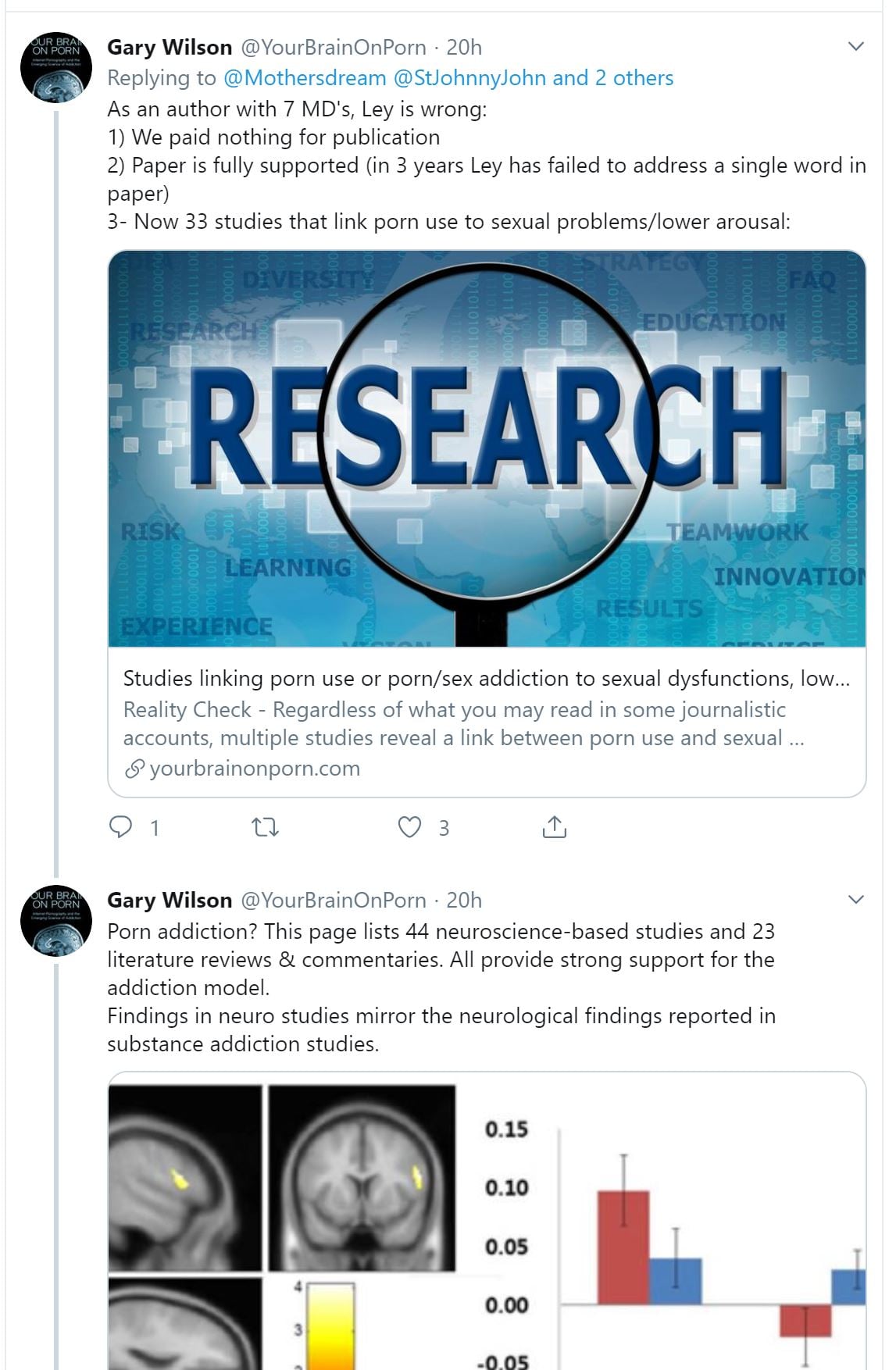
Nicole Prause tweets her falsehoods , claiming the 8 authors were “paid to call it an addiction”.
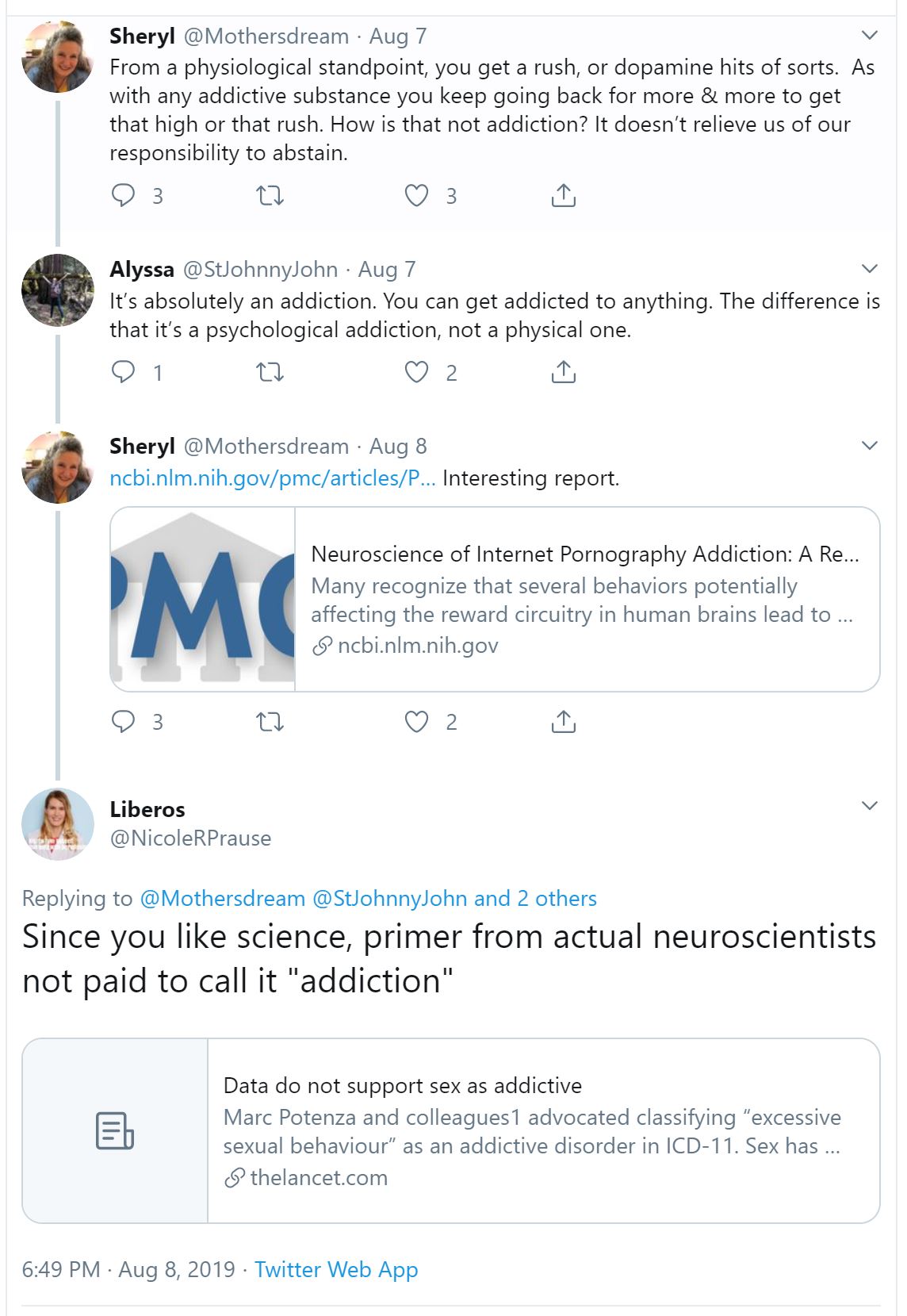
Here she goes again, under the same tweet:
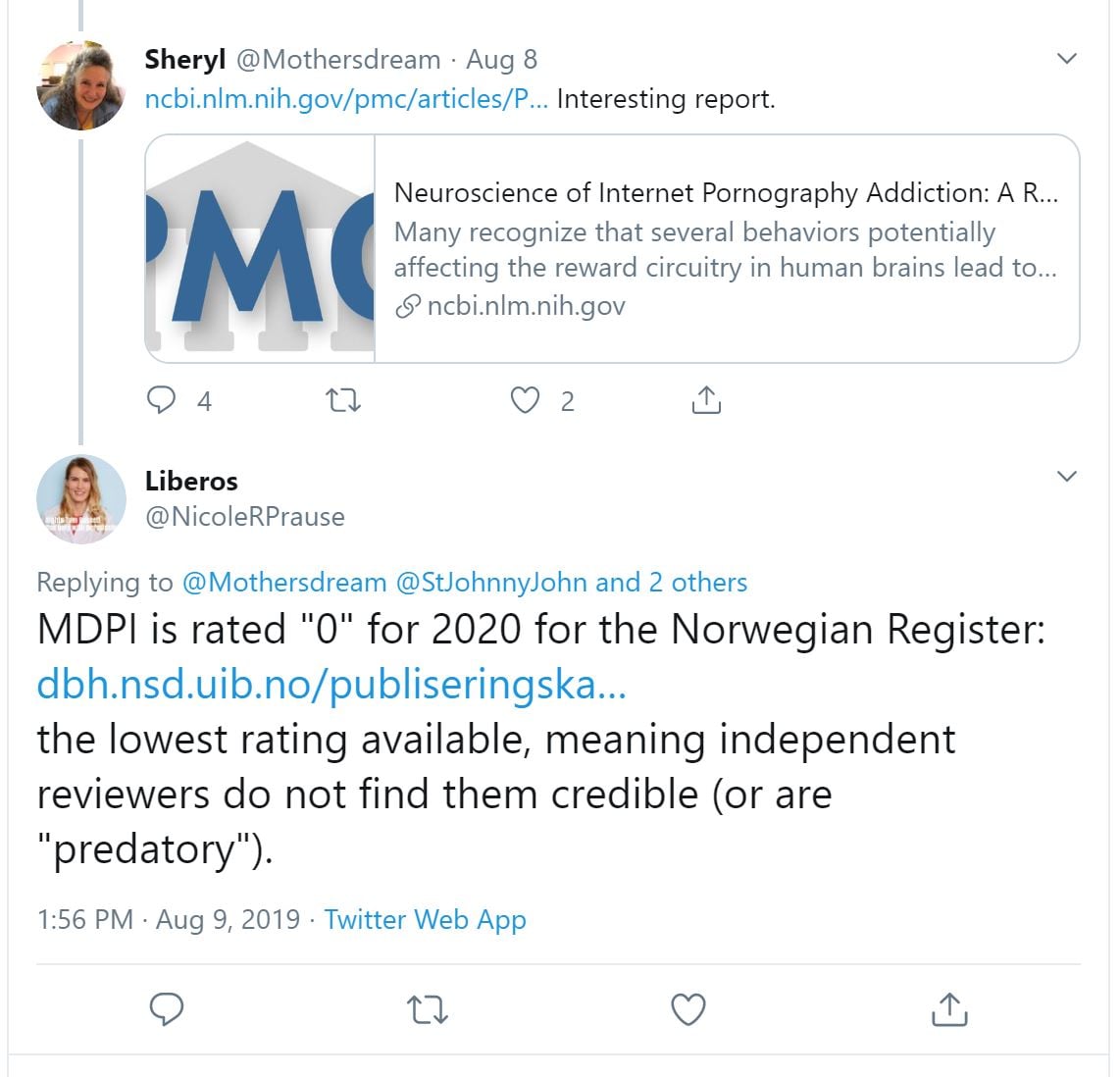
As the CEO of MDPI explained, the actual ratings occur in 2020.
——————
May 24-27, 2018 – Prause creates multiple sock-puppets to edit the MDPI Wikipedia page (and is banned for sock-puppetry & defamation)
In an earlier section we recounted Prause’s harassment of MDPI and its journal Behavioral Sciences. We also chronicled Prause’s long history of employing multiple fake usernames on Wikipedia (which violates its rules) to harass many of the individuals or organizations listed on this page. For example:
- April, 2016: A Nicole Prause sock puppet edits the Belinda Luscombe Wikipedia page
- January, 2017 (and earlier): Prause employs multiple user accounts (including “NotGaryWilson”) to edit Wikipedia
Prause’s latest Wikipedia barrage occurred from May 24th to the 27th and involved at least 6 fake usernames (called “sock-puppets” in Wikipedia jargon). The following links take you to all the edits by these particular usernames (“user contributions”):
- https://en.wikipedia.org/wiki/Special:Contributions/Suuperon
- https://en.wikipedia.org/wiki/Special:Contributions/NeuroSex
- https://en.wikipedia.org/wiki/Special:Contributions/Defender1984
- https://en.wikipedia.org/wiki/Special:Contributions/23.243.51.114
- https://en.wikipedia.org/wiki/Special:Contributions/185.51.228.243
- https://en.wikipedia.org/wiki/Special:Contributions/209.194.90.6
The first four usernames edited the MDPI Wikipedia page, while 3 of the 6 edited the Nofap Wikipedia page, the Sex Addiction page and the Pornography Addiction page. All 3 pages are obsessions of Prause. Even Wikipedia recognized the usernames as belonging to the same person because all the names were banned for “sock-puppetry.” We can be sure it was Prause editing the MDPI page because:
1) The most recent batch of emails between MDPI and Nicole Prause started on May 22, with MDPI notifying all involved that one minor technical correction and an editorial would be forthcoming. This enraged Prause who responded with a string of demands and threats, followed by false accusations and personal attacks.
2) The edits began with user NeuroSex whose only edit before May 24th was an unsuccessful attempt to have other Wikipedia pages link to the Nicole Prause Wikipedia page (February, 2018). From the NeuroSex talk page:
Welcome to Wikipedia. Although everyone is welcome to contribute constructively to the encyclopedia, your addition of one or more external links to the page Nicole Prause has been reverted.
3) The Wikipedia content revolves around one of Prause’s ongoing obsessions: discrediting and attempting retraction of the paper co-authored by Gary Wilson and US Navy doctors: Is Internet Pornography Causing Sexual Dysfunctions? A Review with Clinical Reports (Park et al., 2016)
4) All the Wikipedia edits mirror concurrent Prause tweets and her emails to MDPI (many of which Wilson has seen).
5) The sock-puppets claimed to possess private MDPI emails – which they wanted to post to the MDPI Wikipedia page. Here’s what NeuroSex said in her comment. (Note: In her concurrent emails to MDPI, Prause cc’d RetractionWatch, apparently to threaten MDPI with public retaliation.):
I have images that verify each of the claims (e.g., email from the publisher, email from the listed editor, etc.). RetractionWatch and other outlets are considering writing reviews of it as well, but I cannot be sure those will materialize. How is best to provide such evidence that verifies the claims? As embedded image? Written elsewhere with images and linked?
Let’s provide a few examples of the “NeuroSex” edits (lies) related to Gary Wilson and to Park et al., 2016 – followed by Wilson’s comments:
NeuroSex edit #1: Gary Wilson was by <ref>{{cite web|title=paid over 9000 pounds|url=https://www.oscr.org.uk/downloadfile.aspx?id=160223&type=5&charityid=SC044948&arid=236451}}</ref> The Reward Foundation to lobby in the US on behalf of anti-pornography state declarations.
Wilson comment: NeuroSex linked to a redacted document, claiming that Gary Wilson was paid 9,000 pounds by Scotish charity The Reward Foundation. Two days earlier Prause falsely claimed to journal publisher MDPI (and others) that, based on the charity’s recent public filing (with a name redacted, as is standard), expense reimbursements paid to a charity officer were in fact paid to Wilson. Prause has not checked her facts, and she is mistaken (again). Wilson has never received any money from The Reward Foundation. Gary Wilson forwarded Prause’s claim to Darryl Mead, Chair of The Reward Foundation. His response is above:
From: Foundation Reward <[email protected]>
Sent: Thursday, May 24, 2018 8:17 AM
To: gary wilson
Subject: Re: Concerns raised to the attention of COPE by Nicole Prause. Manuscript ID behavsci-133116
Dear Gary:
I have looked into this. Prause said:
On 22/05/2018 20:48, Nicole Prause wrote:
> It appears Wilson did receive money from The Reward Foundation. Attached is The Reward Foundation Annual Report. Per item C6 referring to travel that describes Gary Wilson’s travel totaling 9,027 pounds.
>
> I request that any correction include this financial COI, or time be allotted to properly demonstrate that this was not a financial conflict of interest.
>
> Nicole Prause, Ph.D. Liberos <http://www.liberoscenter.com>
This is a reference to our 2016-17 Annual Accounts. A version of the accounts with identity redaction was published by the Office of the Scottish Charity Regulator and can be downloaded at https://www.oscr.org.uk/search/charity-details?number=SC044948#results, copy attached. This redaction process is done by OSCR without input from the named charity.
The relevant section with redaction reads as per this screen shot.
The individual referred to in C6 is Darryl Mead, the Chair of the Reward Foundation. I am that person and I made the claim for reimbursement of travel and other costs.
The original document reads as follows:

There is no reference to Gary Wilson in any part of the expenditure for the Reward Foundation because there were no payments to him.
With best wishes,
Darryl Mead
In summary, Prause falsely accused Wilson of receiving funds from The Reward Foundation. She then publicized her lie to MDPI, COPE, RetractionWatch, and others, using the redacted document she submitted (just as NeuroSex lied to Wikipedia in her failed attempt to have her related edits accepted).
Update, 6-7-18: For no reason in particular given that I had not posted and no one cited my work or mentioned me, Prause posted a comment on the ICD-11 about Gary Wilson (must create a username to view comments). In this comment Prause repeats the above lie she stated in an email exchange with MDPI, RetractionWatch, and COPE (and on Wikipedia):
Over the next few days Nicole Prause posted 4 more libelous comments on the ICD-11 attacking Gary Wilson and continuing to falsely assert that he is a paid employee of The Reward Foundation. Darryl Mead, the Chair of The Reward Foundation, eventually responded:
As Expected, Prause responded with several more lies and personal attacks.
Update, 6-18-18: Prause created another Wikipedia username to edit the MDPI wikipedia page – https://en.wikipedia.org/wiki/Special:Contributions/185.51.228.245 – and added the following:
In 2016, another MDPI journal, Behavioral Sciences, published a review paper claiming pornography caused erectile dysfunction. Six scientists independently contacted MDPI concerned about fraud and other issues in the article, initiating an independent review by the Committee on Publication Ethics (COPE). COPE recommended retracting the article.[31] The listed paper editor, Scott Lane, denied having served as the editor. Thus, the paper appears not to have undergone peer-review. Further, two authors had undisclosed conflicts of interest. Gary Wilson’s association with The Reward Foundation did not properly identify it as an activist, anti-pornography organization. Wilson also had posted extensively in social media that the study was “by the US Navy”, although the original paper stated that it did not reflect the views of the US Navy. The other author, Dr. Andrew Doan, was an ophthalmologist who ran an anti-pornography ministry Real Battlefield Ministries, soliciting donations for their speaking.[32] Further, the Committee on Publication Ethics determined that the cases were not properly, ethically consented for inclusion. MDPI issued a correction for some of these issues,[33] but has refused to post corrections for others to date as described by Retraction Watch.[31]
Several of the above lies debunked:
- There were not 6 scientists – only Prause contacted MDPI.
- My association with The Reward Foundation was fully disclosed from the beginning. As explained earlier, my affiliation with The Reward Foundation (TRF) was always clearly stated, both in the initial Behavioral Sciences article and in the recent correction (the original PubMed version). The purpose of the newly published correction was to counter Dr. Prause’s incessant defamatory claims that I receive money from TRF, and that I make money from my book (my proceeds for which, in fact, go to the charity)
- I posted that the paper involved 7 US Navy doctors. The Navy had no problems with my comments.
- Dr. Andrew Doan is both an MD and a PhD (Neuroscience – Johns Hopkins), is the former of Head of “Addictions and Resilience Research” in the Department of Mental Health at the Naval Medical Center. (He has since been transferred and promoted, and has different responsibilities.) Doan has authored multiple papers on behavioral addiction/pathologies relating to technologies (in some cases with a co-author of the paper you have written about here). In short, he is a qualified senior author. Those other papers can be found here: https://www.ncbi.nlm.nih.gov/pubmed/?term=doan+klam. His non-profit, Real Battlefield Ministries (RBM), did not discuss pornography prior to publication of the paper. Even if RBM had presented on pornography it would not have been a conflict of interest.
- As described above, COPE’s decision was hypothetical and did not apply to our paper as the US Navy doctors more than complied with their Naval Medical Center – San Diego’s IRB consent rules. The Naval Medical Center San Diego’s IRB policy does not consider case reports of less than four patients in a single article to be human subject research and does not require the patients to consent to inclusion in an article. Although the researchers were not required to obtain consent, for two cases, verbal and written consents were obtained. In the third case where anonymity was unlikely to be compromised, no written consent was obtained. Incidentally, at Dr. Prause’s insistence, after the paper was published, the actions of the Navy co-authors with respect to this paper were thoroughly reviewed in an independent Navy investigation. Result? I have a copy of the official report by a Navy lawyer affirming that the co-authors complied with all the IRB’s rules.
In a sworn affidavit filed in Federal Court, Gary Wilson stated that Prause (1) used a false identity (Janey Wilson) to defame and harass Wilson, his publisher, and The Reward Foundation, (2) lied in emails, on Wikipedia, and in public comments when stating that Gary Wilson received financial compensation from The Reward Foundation
Prause’s lies and harassment has finally caught up with her.
As thoroughly explained in the previous section Gary Wilson donates the proceeds of his book to The Reward Foundation. Wilson accepts no money, and has never received a dime for any of his efforts. YBOP accepts no ads and Wilson has accepted no fees for speaking. As documented in these sections, Prause has constructed a libelous fairy tale that Wilson is being paid by the same charity he donates his book proceeds to:
- 2015 & 2016: Nicole Prause violates COPE’s code of conduct to harass Gary Wilson, his publisher, and a Scottish charity (The Reward Foundation)
- May – July, 2018: In emails, in the ICD-11 comments section, and on Wikipedia, Prause and her sockpuppets falsely claim that Wilson received 9,000 pounds from The Reward Foundation
In fact, this is not true. The above two sections are addressed in Gary Wilson’s sworn affidavit, which is part of the Dr. Hilton’s defamation lawsuit filed against Dr. Prause.
In a sworn affidavit filed in Federal Court, Gary Wilson stated (under penalty of perjury) that (1) Nicole Prause used a false identity (Janey Wilson) to defame and harass Wilson, his publisher, and The Reward Foundation, (2) that Prause lied in emails, on Wikipedia and in public comments when stating that Gary Wilson received financial compensation from The Reward Foundation.
See full affidavit: July, 2019: Gary Wilson affidavit: Donald Hilton defamation lawsuit against Nicole R Prause & Liberos LLC. Relevant excerpts from Gary Wilson’s sworn affidavit, which is part of the Dr. Hilton’s defamation lawsuit filed against Dr. Prause.

Put simply, Nicole Prause has engaged in provable defamation against Wilson and Dr. Hilton. In addition to Wilson, 8 other victims of Prause have filed sworn affidavits with the court describing defamation, harassment, and malicious reporting to governing bodies and agencies (just the tip of the Prause iceberg).
Prause lies about Gary Wilson in emails to MDPI, David Ley, Neuro Skeptic, Adam Marcus of Retraction Watch, and COPE (May, 2018)
In the May, 2018 email exchanges with MDPI & COPE, Prause copied bloggers who are positioned to damage the reputations of MDPI in the media, if they choose. Ley blogs on Psychology Today and has often served as the Mouth of Prause. Neuro Skeptic has a popular blog that disparages legitimate (and sometimes dubious) research. Adam Marcus writes for Retraction Watch. Prause also copied Iratxe Puebla, who works for COPE, an organization that addresses publication ethics. Already, Adam Marcus of Retraction Watch has taken the bait without adequate investigation.
In her defamatory articles, tweets, and Quora posts Prause has knowingly and falsely stated that I (Gary Wilson) claimed to be “professor in biology” “doctor” or a “neuroscientist.” I was an Adjunct Instructor at Southern Oregon University and taught human anatomy, physiology & pathology at other venues. Although careless journalists and websites have assigned me an array of titles in error over the years (including a now-defunct page on a website that pirates many TEDx talks and describes the speakers carelessly without contacting them) I have always stated that I taught anatomy & physiology. I have never said I had a PhD or was a professor. Prause told the same lie to the email recipients:
PRAUSE EMAIL #1 (5-1-2018)
On Tue, May 1, 2018 at 10:11 PM, Nicole Prause >
Additionally, Mr. Wilson is now using this publication to claim to be a doctor online to unsuspecting patients (attached).
NP
Nicole Prause, Ph.D. Liberos LLC: www.liberoscenter.com
Below is the screenshot Prause uses to “prove” that I have misrepresented my credentials (again, this Gary Wilson page no longer exists). Note: Until Prause produced her “proof,” I had never seen this site and had never communicated with its hosts, never uploaded the page in question and never removed it. Thus I certainly never provided a bio, or claims of “professorship.”
I taught at Southern Oregon University on two occasions. I also taught anatomy, physiology and pathology at a number of other schools over a period of two decades, and was certified to teach these subjects by the education departments of both Oregon and California. I do not seek speaking engagements and have never accepted fees for speaking. Moreover, YBOP accepts no ads, and the proceeds from my book go to a registered charity.
On the “about” page the Keynotes.org website said that it is not an agency and that anyone could upload a video and speaker bio: Keynotes.org is not an agency, but rather, a media site…. Keynotes.org is crowdsourced and fueled by TrendHunter.com, the world’s largest trend spotting website. Again, I’ve never uploaded anything to the site, and I have no idea who uploaded this page (or ordered it removed).
Thus, it is even possible that Prause uploaded this page, with my TEDx talk and a purposely inaccurate bio, in order to fabricate her desired “proof” of misrepresentation – and then removed it. After 5 years of continuous harassment and cyber-stalking, faked documents, libelous assertions, hundreds of tweets, and dozens of usernames with hundreds of comments, nothing would surprise us.
The above screen-shot was part of a larger article by Prause where she falsely claimed that I was fired from Southern Oregon University: March, 2018 – Libelous Claim that Gary Wilson Was Fired. In her article, which was posted on a pornography-related site and Quora, Prause published redacted versions of my Southern Oregon University employment records, falsely stating I was fired and had never before taught at SOU. As with her claims surrounding The Reward Foundation, Prause lied about the true content of what’s in the redacted documents. By the way, David Ley also tweeted the Prause article several times, saying I was fired from SOU (screenshots on the page).
In the end, Prause was permanently banned from Quora for harassing me and the porn-blog site removed Prause’s libelous article.
——————
In an email to MDPI, COPE, Ley, Neuroskeptic, Adam Marcus of Retraction Watch and others Prause falsely claimed that I had received money from The Reward Foundation.
PRAUSE EMAIL #2 (5-22-2018)
Liberos <http://www.liberoscenter.com> On 22/05/2018 20:48, Nicole Prause wrote:
It appears Wilson did receive money from The Reward Foundation. Attached is The Reward Foundation Annual Report. Per item C6 referring to travel that describes Gary Wilson’s travel totaling 9,027 pounds.
I request that any correction include this financial COI, or time be allotted to properly demonstrate that this was not a financial conflict of interest.
Nicole Prause, Ph.D. Liberos
Prause has not checked her facts, and she is mistaken. I have never received any money from The Reward Foundation. I forwarded Prause’s claim to Darryl Mead, Chair of The Reward Foundation, who debunked Prause’s claims: See Above For Documentation.
——————
PRAUSE EMAIL #3 (5-22-2018)
In many of her emails to MDPI (and others), Prause mentioned her “77 criticisms” and falsely claimed that they had not been addressed. This was just the latest:
On Tue, May 22, 2018 at 9:36 AM, Nicole Prause>
I provided a 77 point critique prior to publication that was, true to the predatory journal lists MDPI appeared on, was ignored.
Nicole Prause, Ph.D. Liberos LLC: www.liberoscenter.com
This means Prause was one of two reviewers of the Yale Journal of Biology and Medicine submission – and thus “Janey Wilson.” As explained, many of the 77 so-called problems were carelessly copied and pasted from Prause’s review of the YJBM submission; 25 of them had nothing to do with the Behavioral Sciences submission. In other words, the only reviewer to condemn the paper had cut and pasted dozens of criticisms from a review done at another journal (YJBM), which no longer had any relevance to the paper submitted to Behavioral Sciences. This is highly unprofessional.
Even apart from that glaring irregularity, few of the 77 problems could be considered legitimate. Yet, we carefully combed through each comment mining for useful insights, and wrote a comprehensive response to all comments for Behavioral Sciences and its editors. Almost all of the remaining 50 critical comments were either scientifically inaccurate, groundless, or were simply false statements. Some were repetitive. The authors provided MDPI with a point by point response to each so-called problem.
The exploits of “Janey Wilson” (Prause)
See copies of actual emails below this summary.
Shortly after my book was published in 2015, Prause wrote to my publisher for information, using an alias (“Janey Wilson”). Presuming “Janey” was legitimate, Dan Hind of Commonwealth Publishing advised her that my share of book proceeds went to The Reward Foundation, a registered Scottish charity.
“Janey Wilson” immediately informed the charity that Wilson was “falsely holding himself out publicly as being affiliated with The Reward Foundation,” and saying she had proof. The only way she could have “proof” of this not-yet-public affiliation was if she had seen the academic paper I had co-authored. It’s a violation of publication ethics rules to disclose or misuse information learned through the review process.
“Janey’s” information failed to elicit the desired outrage from The Reward Foundation (as I was indeed affiliated with the Foundation, serving in an unremunerated position as “Honorary Science Officer”). Undaunted, “Janey” then reported The Reward Foundation to the Scottish Charity Regulator for imagined financial and other alleged misdeeds.
The charity was so new that no financial filings had been required yet, so it was not even legally possible for the Reward Foundation to have committed the financial reporting transgressions that “Janey” alleged.
Around the time that “Janey” (1) wrote The Reward Foundation to tell it about my “false” claim of affiliation, and (2) reported the charity itself to the Scottish Charity Regulator, “Janey” also wrote the Edinburgh organization where the charity is domiciled with false claims about me and The Reward Foundation (see below). The Edinburgh entity is called “The Melting Pot.” It’s an umbrella organization that hosts various small enterprises. “Janey” apparently simultaneously posted about this on the redddit/pornfree porn recovery forum – Gary Wilson is profiting from YBOP:
The above is hardly surprising as Prause has employed many sock-puppet identities to post, primarily on porn-recovery forums, about Wilson. For exmaple hundreds of comments by Prause’s apparent avatars can be found at the links below. And, they are but an incomplete collection:
- July, 2013: Prause publishes her first EEG study. Wilson critiques it. Prause employs multiple usernames to post lies around the Web
- November 2013: Prause places a libelous PDF on her SPAN Lab website. Content mirrors “anonymous” comments around the Web
- December 2013: Prause’s initial tweet is about Wilson & the CBC. “RealScience” posts same false claims on same day
- May 2014: Dozens of Prause sock puppets post information on porn recovery forums that only Prause would know or care about
Another reddit/pornfree post that appeared about the same time (Prause deleted her sockpuppet’s username, as she often did after posting):
Janey/Prause made the irrational claim that I was “paying off” The Reward Foundation for a TEDx talk opportunity that occurred years earlier, in 2012. It had been arranged in 2011, years before the charity was conceived of or organized. Obviously, no such subterfuge was needed. I had the right to give my book proceeds to anyone at any point, or put them in my pocket. I chose the Reward Foundation because I respect its balanced, educational objective.
Neither organization (the Scottish Charity Regulator nor the Melting Pot) responded to “Janey,” as she offered no evidence, and wouldn’t identify herself, claiming “whistleblower status” (although, of course, she wasn’t an employee of either, and was not under threat). Had the charity not had a strong, respected relationship with the Melting Pot, and had it already been required to file financial statements with the Scottish Charity Regulator, “Janey’s” malicious claims might have done a lot of damage to the charity’s reputation and initiated a time-consuming, costly audit, etc.
In late 2016, Prause outed herself as “Janey Wilson” when she demanded (repeatedly and unsuccessfully) that Dan Hind of Commonwealth Publishing confirm my connection with the Scottish charity called The Reward Foundation to Prause in writing. Copying both MDPI (the ultimate publisher of the paper discussed earlier) and a publication ethics organization (COPE), Prause told Commonwealth’s Hind that he had already written her to this effect.
However, the only correspondence Hind had with anyone on the subject of Wilson and The Reward Foundation was with “Janey,” and he has stated this in writing (below). Thus, Prause has now outed herself as the former “Janey.” When Hind didn’t respond to Prause’s repeated demands, she then demanded the information via Commonwealth’s web designer – accompanied, as usual, by defamation and threat:
You may wish to encourage the site content owner that you designed to clarify that his author was caught claiming to “donate” proceeds from a book that actually went into his own pocket. Mr. Hind has failed to respond to inquiries with the Committee on Publication Ethics. I assume you would not want your name entangled in fraud like this in any way.
Prause seems to believe that the fact that my share of book proceeds goes to a Scottish registered charity, which I listed as my affiliation for purposes of two academic papers published in 2016, means that I am somehow pocketing the proceeds (from my own book) – and thus have a conflict of interest, which is purportedly grounds, in her mind, for my paper being retracted. Does any of this make any sense in light of the facts?
In fact, I am not on the Board of the charity, and certainly have no say over the book proceeds it receives as a consequence of my irrevocable donation. Incidentally, my affiliation is now public, as it is mentioned in both papers I published in 2016. In short, there is nothing hidden or improper going on, and no conflict of interest whatsoever – despite Prause’s claims behind the scenes and publicly.
Within days of Nicole Prause (as herself) emailing MDPI to demand that they retract Park et al., 2016, Twitter account “pornhelps” attacked Mary Sharpe of The Reward Foundation. In the tweet @pornhelps all but admits she is Prause:
Prause, a Kinsey grad and former academic, calls herself a neuroscientist, and appears to have started college about 15 years earlier. Not long after this revealing tweet “pornhelps” deleted both its Twitter account and website (pornhelps.com) – as it became apparent to others that Prause often tweeted with this account and helped with the website.
The following sections of Prause page provide examples of Prause and “pornhelps” simultaneously attacking and defaming some of Prause’s favorites targets (men who run porn-recovery forums, porn addiction researchers, TIME editor Belinda Luscombe, who wrote a cover story Prause didn’t approve of):
- March, 2015 (ongoing): Prause and her sock puppets (including “PornHelps”) go after Gabe Deem
- June, 2016: Prause and her sock puppet PornHelps claim that respected neuroscientists are members of “anti-porn groups” and “their science is bad”
- July, 2016: Prause & sock puppet “PornHelps” attack Alexander Rhodes, falsely claiming he faked porn-induced sexual problems
- July, 2016: Nicole Prause & “PornHelps” falsely accuse TIME editor Belinda Luscombe of lying and misquoting
Update: In May, 2018 Prause falsely claimed to journal publisher MDPI (and others) that, based on the charity’s recent public filing (with a name redacted, as is standard), expense reimbursements paid to a charity officer were in fact paid to me. I forwarded Prause’s claim to Darryl Mead, Chair of The Reward Foundation, who debunked Prause’s claims: See Above For Documentation.
———-
A few of the other emails referred in the “Janey” story:
2015
[“Janey’s” exchange with my publisher]
From: Daniel Hind <[email protected]>
Date: Thu, Mar 26, 2015 at 10:15 AM
Subject: RE: Concern about for-profit posing as non-profit at Melting Pot
I was contacted by someone called Janey Wilson on Saturday. The full exchange between us is cut and pasted below. As you can see I told her that the author’s revenues are paid to the Reward Foundation.
I should have checked with you, I guess. I am sorry if I have created unnecessary complications for anyone.
Dan
——————————–
Date: Thu, 26 Mar 2015 16:59:12 +0000
Subject: Fwd: Wilson text
From: [email protected]
To: [email protected]
———- Forwarded message ———-
From: Dan Hind <[email protected]>
Date: Tue, Mar 24, 2015 at 9:33 AM
Subject: Re: Wilson text
To: Janey Wilson <[email protected]>
The Charity Commission is a register of charities in England and Wales. The Reward Foundation is registered in Scotland.
Here is its listing on the Scottish Charity Register –
In the UK many responsibilities are devolved to the Scottish Parliament, including the registration of charities, it seems.
I hope this clears up any confusion,
Yours sincerely,
Dan Hind
—–
On Tue, Mar 24, 2015 at 7:15 AM, Janey Wilson <[email protected]> wrote:
Dear Dan Hind,
Thank you for the information. I would not normally check, but I’m glad I did. That organization actually is not registered in the UK:
http://apps.charitycommission.gov.uk/Showcharity/RegisterOfCharities/registerhomepage.aspxThis is the government registry, so I am not sure where else it could be. You might want to alert your author that they might be contributing to a scam. I cannot buy based on this, and I don’t think anyone else should either.
J
——-
On Mon, Mar 23, 2015 at 4:42 AM, Dan Hind <[email protected]> wrote:
Dear Ms Wilson,
The author’s income supports the Reward Foundation, a registered charity in the UK.
http://www.rewardfoundation.org/
Yours sincerely,
Dan Hind
—-
On Sat, Mar 21, 2015 at 6:17 AM, Janey Wilson <[email protected]> wrote:
Hi,
I saw the proceeds from this book are all going to research. Which organization is benefiting? I would like to see if I can list it on my taxes as a deduction.
———
[“Janey’s” exchange with The Melting Pot]
On 25 March 2015 at 12:08 Mohammad Abushaaban <[email protected]> wrote:
Mary – hope you are keeping strong.
I’ve received this strangely out of the blue email from a Janey Wilson…
Do you know this person?
Give it a read and let me know your thoughts.
Thanks
Mo.
———- Forwarded message ———-
From: Janey Wilson <[email protected]>
Date: 25 March 2015 at 04:09
Subject: Concern about for-profit posing as non-profit at Melting Pot
To: [email protected]Dear Mohammad Abushaaban,
I write out of concern for The Reward Foundation housed at The Melting Pot, which is posing as a non-profit. In 2012, Mary Sharpe was responsible for selecting TEDX speakers in Glasgow. She made the extremely odd decision to have a massage therapist with no neuroscience background, Gary Wilson, rave about the neuroscience of “porn addiction”. The talk was so poor it is currently under investigation for its pseudoscience by TEDX. Now, Mr. Wilson appears to be paying Mary Sharpe for this opportunity.
Specifically, he is selling a book and all the proceeds of the book are said to be going to The Reward Foundation for “research”:
www.therewardfoundation.org
Yet, Mary Sharpe is not a researcher, has no neuroscience background, and the charity lists no way for any real scientist to apply for these funds. The money appears to be going directly in to her pocket, likely in exchange for her earlier TEDX favor. The charity further has chosen not to openly provide links to their financials.I have filed this complaint with the Scottish Charity Register as well. I suggest you consider investigating how else Ms. Sharpe might be using pseudo-science to fleece concerned individuals. That hardly seems in line with any of the aspirational goals listed on the Melting Pot website.
J
—
Mohammad Abushaaban, Business Coordinator
Dynamic resources for social change makers
5 Rose Street, Edinburgh, EH2 2PR
Tel: +44 (0)131 243 2626/3www.TheMeltingPotEdinburgh.org.uk
Company No: SC291663
From: Janey Wilson <[email protected]>
Date: 22 April 2015 at 17:21
Subject: Re: Concern about for-profit posing as non-profit at Melting Pot
To: Mohammad Abushaaban <[email protected]>I now have documentation that Gary Wilson himself is claiming to be a member of the Reward Foundation. While he is not listed on the new website page (http://www.rewardfoundation.org/who-we-are.html), this represents a rather worse transgression. He claims to “donate” the proceeds of his book to research, which is now going to a charity that has no research plans and of which he is a part. Mary Sharpe may not even be aware he is making these claims, I am not sure, but he has now made them publicly.
——–
As explained above, an earlier and substantially different version of the paper I co-authored with 7 US Navy doctors, Park, et al., was first submitted in March, 2015 to the Yale Journal of Biology and Medicine as part of its “Addiction” issue. This paper was the only place my affiliation with the Reward Foundation could be found at the time of “Janey’s” exchanges, as it was nowhere public. So “Janey” had to have seen the paper sent to YJBM for review.
——-
2016
Prause contacting my publisher, Dan Hind, eventually outing herself as “Janey Wilson”
From: Nikky [email protected]
Sent: 03 November 2016 21:27
To: Dan Hind; [email protected]
Cc: Dr. Franck Vazquez | CEO | MDPI; Iratxe Puebla; [email protected]; Martyn Rittman; Dr. Shu-Kun Lin; Jim Pfaus
Subject: Re: Book financial beneficiaryMr. Hind,
We already have a previous email from you verifying that Gary Wilson has sent all the proceeds of his book to the organization he actually is employed by, The Reward Foundation. You may choose not to verify this information for the Committee on Publication Ethics, but the previous email can be supplied to them as well.
Your author failed to disclose his financial conflict of interest in numerous publications now to profit himself while claiming to “donate” the proceeds to the public (and to you). This already is public knowledge that you either can be on record to help expose or profiteer, as you please.
NP
Nicole Prause, Ph.D.
Research: www.span-lab.com
Liberos LLC: www.liberoscenter.com
323.919.0783
———————-
Email to Dan Hind’s web designer:
From: Jamie Kendall <[email protected]>
Sent: 04 November 2016 11:32
To: Daniel Hind
Subject: Fwd: Book financial beneficiaryHi Dan,
Told them I’d forward whatever this is on to you.
Jamie
Jamie Kendall MA (RCA)
www.jamiekendall.com
Begin forwarded message:
From: Nikky <[email protected]>
Subject: Fwd: Book financial beneficiary
Date: 3 November 2016 at 21:31:24 GMT
Dear Mr. Kendall,
You may wish to encourage the site content owner that you designed to clarify that his author was caught claiming to “donate” proceeds from a book that actually went into his own pocket. Mr. Hind has failed to respond to inquiries with the Committee on Publication Ethics. I assume you would not want your name entangled in fraud like this in any way.
NP
Nicole Prause, Ph.D.
Research: www.span-lab.com
Liberos LLC: www.liberoscenter.com
323.919.0783
Summary:
- March, 2015 an earlier version of Park et al. was submitted to the Yale Journal of Biology and Medicine. The submission to YJBM was the only place my affiliation with the charity The Reward Foundation (TRF), could be found, as it was nowhere public.
- Between March 21st and April 22nd of 2015, “Janey Wilson” sent several emails to Dan Hind of Commonwealth Publishing, Mohammad Abushaaban of The Melting Pot Edinburgh (which houses The Reward Foundation), and the Scottish Charity Regulator. All contain unsupported claims of wrongdoing. It seemed likely from the content and distinctive style that “Janey” was actually Nicole Prause – which was later confirmed.
- The YJBM was informed of the harassing behavior (engaged in by one of their two reviewers posing at “Janey Wilson”). When it was suggested that Dr. Prause might be behind these bizarre emails and the paper’s initial rejection, the paper was promptly accepted…and then not published after all, based on a claim that it was too late to meet the print deadline for the YJBM’s “Addiction” issue.
- An updated version of the paper was then submitted to the journal Behavioral Sciences. Four individuals reviewed the paper with 3 accepting and Prause (as we later discovered) rejecting it with her list of “77 problems”.
- Many of her 77 so-called problems were carelessly copied and pasted from Prause’s review of the YJBM submission, as 25 of them had nothing to do with the Behavioral Sciences paper.
- Few of the 77 problems could be considered legitimate. The authors provided MDPI with a point by point response to each so-called problem.
- Park et al. was revised and re-reviewed by two more reviewers.
- As soon as Park et al., 2016 was published, Prause began her campaign to have the paper retracted, sending countless of messages to MDPI, COPE, the Navy, the doctors’ medical boards, and my publisher (and possibly PubMed, the FTC and who knows where else).
- MDPI offered Prause the opportunity to publish a formal comment on Park et al, in Behavioral Sciences. Prause declined. If the paper were truly inadequate, it would be a simple matter to discredit it with a formal comment.
- In late 2016, Prause outed herself as “Janey Wilson” when she demanded (repeatedly and unsuccessfully) that my publisher confirm my connection with the Scottish charity called The Reward Foundation to Prause in writing. Copying both MDPI (the ultimate publisher of the paper mentioned above) and a publication ethics organization, Prause told Commonwealth’s Dan Hind that he had already written her to this effect. Yet he had only corresponded about the connection with “Janey.”
- While vicious in her attacks, and often lying about me and the paper’s content, Prause ultimately came up with only 2 issues that COPE would consider (1) Gary Wilson’s unremunerated position with The Reward Foundation, (2) Consents by the three individuals featured in the case studies.
- Although I very much sympathize with COPE, and can easily envision the battering their Committee must have endured, in my view, neither is valid reason for retraction or even for a correction (although such superficial corrections are no big deal), as
- My unremunerated connection with The Reward Foundation was plainly not a conflict of interest and my affiliation had already been revealed in the original paper, and
- The Navy followed its guidelines for consent (which actually don’t require any written consents for case studies with fewer than 4 patients). Even so, in an abundance of physician-ly caution, full written prior consent was obtained for two individuals. For the third, not enough details to require consent were deemed given in the paper. A US Navy investigation confirmed that the doctors complied with all the IRB’s rules.
Even if some might disagree with me, it is evident that neither of these points involves “fraud” or misconduct, as Prause continues to insist.
What’s going on here?
For years both Prause and Ley have teamed up to defame, harass and cyber-stalk individuals and organizations that have warned of porn’s harms or published research reporting porn’s harms. Recently, Prause and Ley escalated their unethical and often illegal activities in support of a porn industry agenda. For example, 0n January 29, 2019, Prause filed a trademark application to obtain YOURBRAINONPORN and YOURBRAINONPORN.COM. In April 2019, a group headed by Prause and Ley engaged in unlawful trademark infringement of YourBrainOnPorn.com by creating “RealYourBrainOnPorn.com.
To advertise their illegitimate site, the self-proclaimed “experts” created a Twitter account (https://twitter.com/BrainOnPorn), YouTube channel, Facebook page, and published a press release. In a further attempt to confuse the public, the press release falsely claims to originate from Gary Wilson’s home town – Ashland, Oregon (none of the “experts” live in Oregon, let alone Ashland). Judge for yourself whether the “experts” further the interests of the porn industry or the authentic search scientific truth by perusing this collection of RealYBOP tweets. Written in Dr. Prause’s distinctive misleading style, the tweets extol the benefits of porn, misrepresent the current state of the research, and troll individuals and organizations Prause has previously harassed.
In addition, the “experts” created a Reddit account (user/sciencearousal) to spam porn recovery forums reddit/pornfree and reddit/NoFap with promotional drivel, claiming porn use is harmless and disparaging YourBrainOnPorn.com and Gary Wilson. It’s important to note that Prause, a former academic, has a long documented history of employing numerous aliases to post on porn recovery forums. (YBOP is now engaged in legal action with Prause and her pro-porn allies).
In July of 2019, David Ley and two of the better known RealYBOP “experts” (Justin Lehmiller and Chris Donaghue) began openly collaborating with the porn industry. All 3 are on the advisory board of the fledgling Sexual Health Alliance (SHA). In a blatant financial conflict of interest, David Ley and the SHA are being compensated by porn industry giant xHamster to promote its websites (i.e. StripChat) and to convince users that porn addiction and sex addiction are myths!
More on Nicole Prause
In 2013 former UCLA researcher Nicole Prause began openly harassing, libeling and cyberstalking Gary Wilson. (Prause has not been employed by an academic institution since January, 2015.) Within a short time she also began targeting others, including researchers, medical doctors, therapists, psychologists, a former UCLA colleague, a UK charity, men in recovery, a TIME magazine editor, several professors, IITAP, SASH, Fight The New Drug, Exodus Cry, NoFap.com, RebootNation, YourBrainRebalanced, the academic journal Behavioral Sciences, its parent company MDPI, US Navy medical doctors, the head of the academic journal CUREUS, and the journal Sexual Addiction & Compulsivity.
While spending her waking hours harassing others, Prause cleverly cultivated – with zero verifiable evidence – a myth that she was “the victim” of most anyone who dared to disagree with her irresponsible assertions surrounding porn’s effects or the current state of porn research. To counter the ongoing harassment and false claims, YBOP was compelled to document some of Prause’s activities. Consider the following pages. (Additional incidents have occurred that we are not at liberty to divulge – as Prause’s victims fear further retribution.)
- Nicole Prause’s Unethical Harassment and Defamation of Gary Wilson & Others
- Nicole Prause’s Unethical Harassment and Defamation of Gary Wilson & Others (page 2)
- Nicole Prause & David Ley libelous claim that Gary Wilson was fired from Southern Oregon University
- Prause’s efforts to have Behavioral Sciences review paper (Park et al., 2016) retracted
- Article by University of Wisconsin student newspaper (The Racquet) posts false police report by Nicole Prause (March, 2019)
- Aggressive Trademark Infringement Waged by Porn Addiction Deniers (www.realyourbrainonporn.com)
In the beginning Prause employed dozens of fake usernames to post on porn recovery forums, Quora, Wikipedia, and in the comment sections under articles. Prause rarely used her real name or her own social media accounts. That all changed after UCLA chose not to renew Prause’s contract (around January, 2015).
 Freed from any oversight and now self-employed, Prause added two media managers/promoters from Media 2×3 to her company’s tiny stable of “Collaborators.” (erstwhile Media 2×3 president Jess Ponce describes himself as a Hollywood media coach and personal branding expert.) Their job is to place articles in the press featuring Prause, and find her speaking engagements in pro-porn and mainstream venues. Odd tactics for a supposedly impartial scientist.
Freed from any oversight and now self-employed, Prause added two media managers/promoters from Media 2×3 to her company’s tiny stable of “Collaborators.” (erstwhile Media 2×3 president Jess Ponce describes himself as a Hollywood media coach and personal branding expert.) Their job is to place articles in the press featuring Prause, and find her speaking engagements in pro-porn and mainstream venues. Odd tactics for a supposedly impartial scientist.
Prause began to put her name to falsehoods, openly cyber-harassing multiple individuals and organizations on social media and elsewhere. Since Prause’s primary target was Gary Wilson (hundreds of social media comments along with behind the scenes email campaigns), it became necessary to monitor and document Prause’s tweets and posts. This was done for her victims’ protection, and crucial for any future legal actions.
It soon became apparent that Prause’s tweets and comments were rarely about sex research, neuroscience, or any other subject related to her claimed expertise. In fact, the vast majority of Prause’s posts could be divided into two overlapping categories:
- Indirect support of the porn industry: Defamatory & ad hominem comments targeting individuals and organizations that she labeled as “anti-porn activists” (often claiming to be a victim of these individuals and organizations). Documented here: page 1, page 2.
- Direct support of the porn industry:
- especially the FSC (Free Speech Coalition), AVN (Adult Video News), porn producers, performers, and their agendas
- countless misrepresentations of the state of pornography research and attacks on porn studies or porn researchers.
The following pages contain a sampling of tweets and comments related to #2 – her vigorous support of the porn industry and its chosen positions. YBOP is of the view that Prause’s unilateral aggression has escalated to such frequent and reckless defamation (falsely accusing her many victims of “physically stalking her,” “misogyny,” “encouraging others to rape her,” and “being neo-Nazis”), that we are compelled to examine her possible motives. This material is divided into 4 main sections:
- SECTION 1: Nicole Prause & the porn industry:
- Falsely accusing others of saying the porn industry funds some of her research
- In 2015 the Free Speech Coalition offers Prause assistance: she accepts and immediately attacks Prop 60 (condoms in porn)
- The Free Speech Coalition allegedly provided subjects for a Prause study that “debunks” porn addiction
- Prause’s direct support for porn industry (FSC, AVN, XBIZ, xHamster, PornHub)
- Prause’s intimate relationships with porn industry performers, directors, and producers
- Evidence that Nicole Prause attends porn industry awards (XRCO, AVN)
- SECTION 2: Was Nicole Prause “PornHelps”? (PornHelps website, @pornhelps on Twitter, comments under articles). All accounts deleted once Prause was outed as “PornHelps.”
- SECTION 3: Examples of Nicole Prause supporting porn industry interests via misrepresentation of the research & attacking studies/researchers.
- SECTION 4: “RealYBOP”: Prause and associates create a biased website and social media accounts that support a pro-porn industry agenda.
Please note: There is unequivocal evidence that the porn industry funded the sexology profession for decades. Sexology’s agenda still appears to serve the porn industry. Thus, the evidence on this page should be viewed in a larger context. See Hugh Hefner, the International Academy of Sex Research, and Its Founding President to understand how porn-industry friendly sexologists influenced the Kinsey Institute. Prause is a Kinsey grad.
More on David Ley
David Ley’s financial conflicts of interest (COI) seem evident.
COI #1: In a blatant financial conflict of interest, David Ley is being compensated by porn industry giant X-hamster to promote their websites and to convince users that porn addiction and sex addiction are myths! Specifically, David Ley and the newly formed Sexual Health Alliance (SHA) have partnered with a X-Hamster website (Strip-Chat). See “Stripchat aligns with Sexual Health Alliance to stroke your anxious porn-centric brain“:
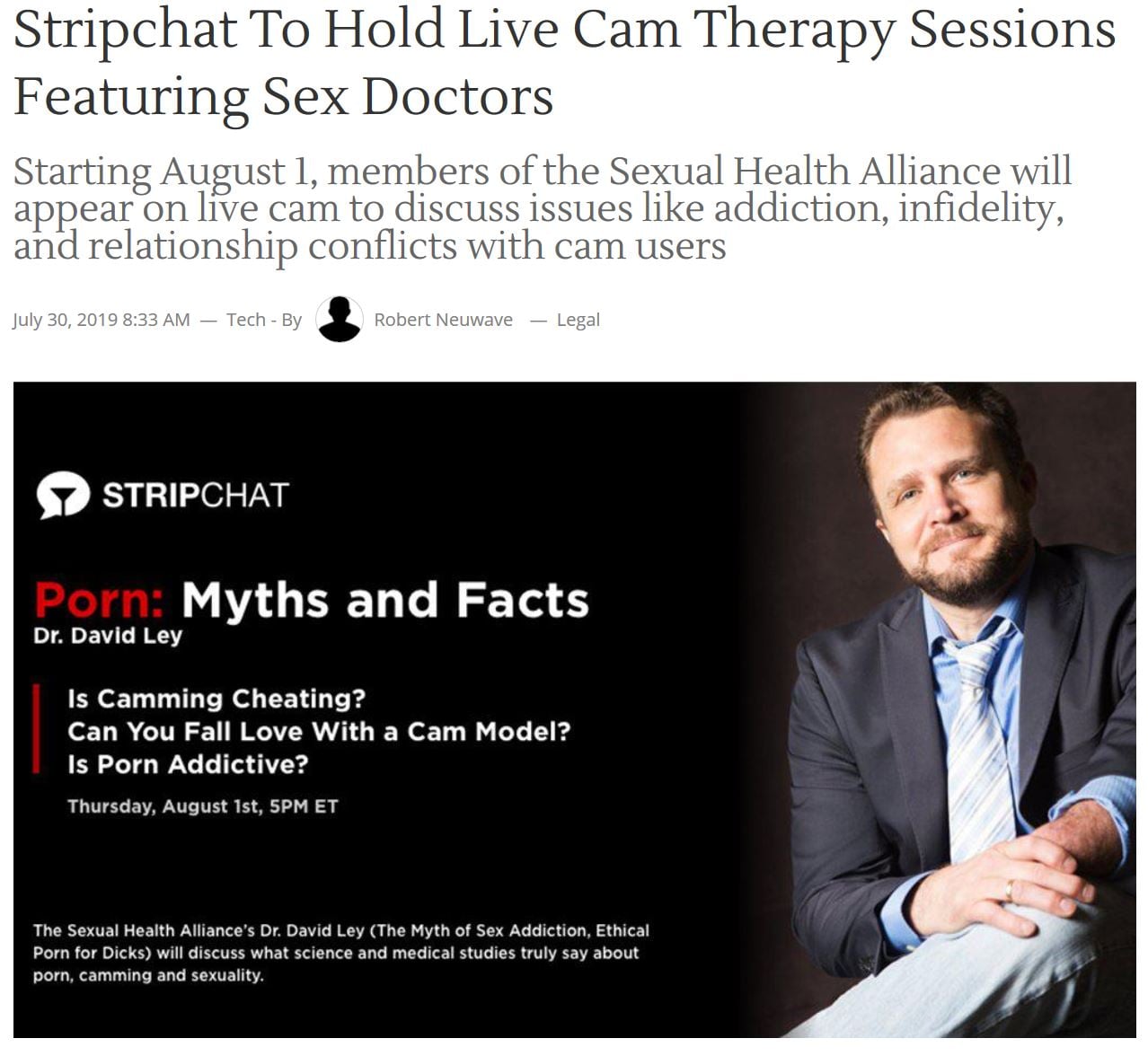
The fledgling Sexual health Alliance (SHA) advisory board includes David Ley and two other RealYourBrainOnPorn.com “experts” (Justin Lehmiller & Chris Donahue). RealYBOP is a group of openly pro-porn, self-proclaimed “experts” headed by Nicole Prause. This is also the group currently engaged in illegal trademark infringement and squatting directed toward the legitimate YBOP. Put simply, those trying to silence YBOP are also being paid by the porn industry to promote its/their businesses, and assure users that porn and cam sites cause no problems (note: Nicole Prause has close, public ties to the porn industry as documented on this page).
In this article, Ley dismisses his compensated promotion of the porn industry:
Granted, sexual health professionals partnering directly with commercial porn platforms face some potential downsides, particularly for those who’d like to present themselves as completely unbiased. “I fully anticipate [anti-porn advocates] to all scream, ‘Oh, look, see, David Ley is working for porn,’” says Ley, whose name is routinely mentioned with disdain in anti-masturbation communities like NoFap.
But even if his work with Stripchat will undoubtedly provide fodder to anyone eager to write him off as biased or in the pocket of the porn lobby, for Ley, that tradeoff is worth it. “If we want to help [anxious porn consumers], we have to go to them,” he says. “And this is how we do that.”
Biased? Ley reminds us of the infamous tobacco doctors, and the Sexual health Alliance remind us of the Tobacco Institute.

COI #2 David Ley is being paid to debunk porn and sex addiction. At the end of this Psychology Today blog post Ley states:
“Disclosure: David Ley has provided testimony in legal cases involving claims of sex addiction.”
In 2019 David Ley’s new website offered his well-compensated “debunking” services:
David J. Ley, Ph.D., is a clinical psychologist and AASECT-certified supervisor of sex therapy, based in Albuquerque, NM. He has provided expert witness and forensic testimony in a number of cases around the United States. Dr. Ley is regarded as an expert in debunking claims of sexual addiction, and has been certified as an expert witness on this topic. He has testified in state and federal courts.
Contact him to obtain his fee schedule and arrange an appointment to discuss your interest.
COI #3: Ley makes money selling two books that deny sex and porn addiction (“The Myth of Sex Addiction,” 2012 and “Ethical Porn for Dicks,” 2016). Pornhub (which is owned by porn giant MindGeek) is one of the five back-cover endorsements listed for Ley’s 2016 book about porn:

Note: PornHub was the second Twitter account to retweet RealYBOP’s initial tweet announcing its “expert” website, suggesting a coordinated effort between PornHub and the RealYBOP experts. Wow!
COI #4: Finally, David Ley makes money via CEU seminars, where he promotes the addiction-deniers’ ideology set forth in his two books (which recklessly(?) ignores dozens of studies and the significance of the new Compulsive Sexual Behavior Disorder diagnosis in the World Health Organization’s diagnostic manual). Ley is compensated for his many talks featuring his biased views of porn. In this 2019 presentation Ley appears to support and promote adolescent porn use: Developing Positive Sexuality and Responsible Pornography Use in Adolescents.
June, 2019: MDPI (the parent company of the journal Behavioral Sciences) publishes an editorial about Nicole Prause’s unethical behavior surrounding her unsuccessful attempts to have Park et al., 2016 retracted
The MDPI comment on Prause’s behavior (which has been documented above):
21 June 2019
In August 2017, Behavioral Sciences published the article [1], which includes a case study of three individuals in the US Navy. The paper underwent our usual editorial process, including peer review, and was accepted for publication. Since then, we have received a number of complaints from a single individual claiming that the paper is seriously flawed and calling for withdrawal of the article. In this comment we wish to reiterate that the correct procedures were followed in the handling of the manuscript and to publicly counter some of the claims. The Committee for Publication Ethics (COPE) considered some of these issues and we are grateful for their advice and cooperation. We also wish to thank the authors for their cooperation.
One serious claim leveled against the paper was that the required consent was not sought from the three individuals featured in the case studies presented. According to the instructions for authors posted on the Behavioral Sciences website, informed consent should be obtained for case studies where there is any risk that individuals could be identified. When asked to confirm this point, the authors verified that consent had been obtained for two individuals and that for the third not enough details were shared in the paper to require consent. The editorial office has seen redacted copies of the consent form used and is satisfied with the authors’ explanation.
Another issue was that the academic editor of the article was not aware that he was making a final decision to accept article [1] for publication. Behavioral Sciences uses a standard template to invite editors to make the final decision to accept manuscripts, which was also done in this case. Since the complaint, the original academic editor has informed us that he was not aware that this was his role for the paper. We re-evaluated the peer review process with the (now former) Editor-in-Chief John Coverdale and made the decision that the manuscript should not be removed for this reason. In the published Correction [2], the academic editor information has been amended.
Numerous claims about conflicts of interest of the authors were made in relation to [1]. Only one non-financial conflict of interest was found to be substantiated and the paper has been updated [2].
Consequently, MDPI has updated its instructions for authors to provide more clarity about informed consent issues and to better guide authors in this area. Our requirements and policies have not changed and we continue to follow the guidelines provided by COPE.
We believe that the dispute surrounding this paper arose from a difference of opinion in terms of the treatment of individuals using high levels of pornography, and was not motivated by genuine concerns about the editorial work around the paper [3]. Our view is that the correct way to deal with such a dispute is by presenting arguments and counter-arguments in a peer-reviewed, scientific context where all conflicts of interest from both parties are properly disclosed. Personal criticism does not have a place in this context and attempts to shut down those with opposing views by removing their work from the literature is not the correct approach. We know that the majority of authors and readers approach research in a constructive and engaged way and we wish to advocate this approach for the benefit of the research community as a whole.
References
[1] Park, B.Y.; Wilson, G.; Berger, J.; Christman, M.; Reina, B.; Bishop, F.; Klam, W.P.; Doan, A.P. Is Internet Pornography Causing Sexual Dysfunctions? A Review with Clinical Reports. Sci. 2016, 6, 17.
[2] Park, B.Y. et al.; Correction: Park, B.Y., et al. Is Internet Pornography Causing Sexual Dysfunctions? A Review with Clinical Reports Sci. 2016, 6, 17. Behav. Sci. 2018, 8, 55.
[3] Marcus, A. “Journal corrects, but will not retract, controversial paper on internet porn”. Retraction Watch. Available online: https://retractionwatch.com/2018/06/13/journal-corrects-but-will-not-retract-controversial-paper-on-internet-porn/ (accessed on 13 June 2018) and https://web.archive.org/web/20180913124808/https://retractionwatch.com/2018/06/13/journal-corrects-but-will-not-retract-controversial-paper-on-internet-porn/ (archived on 13 September 2018).
Gary Wilson’s comments on the following sentence:
Only one non-financial conflict of interest was found to be substantiated and the paper has been updated [2].
As I explained in my Retraction Watch comment (which was partially censored by Retraction Watch!), my association with The Reward Foundation was on the original paper, and on an earlier version submitted to The Yale Journal of Biology & Medicine in early 2015. My comment:
What’s not clear in this article is that my (Wilson’s) affiliation with The Reward Foundation was disclosed from the start (see the original PubMed version, published in August, 2016 – https://www.ncbi.nlm.nih.gov/pmc/articles/PMC5039517/). The correction was published for my protection, in an attempt to stop Dr. Prause from continuing to claim that I was being paid by The Reward Foundation as a lobbyist, or just being “paid off.” (She has publicly advanced several baseless theories about my imagined corruption.) In the journal’s correction, only the title of my book (“Your Brain On Porn: Internet Pornography and the Emerging Science of Addiction”) and a clear indication of my unremunerated role at The Reward Foundation were added. Again, this was to prevent further assertions of any possible financial conflict of interest. Corrected version: http://www.mdpi.com/2076-328X/8/6/55/htm
Put simply, the correction was meant to protect me from Prause and her littany of falsehoods surrounding this paper.
June, 2019: MDPI official response to the MDPI Wikipedia page (which has been edited by several Nicole Prause sockpuppets)
Not long after Park et al., 2016 was published Prause went on the warpath against MDPI, Behavioral Sciences, and the authors of Park et al., employing multiple avenues of overt and covert attack (documented on this extensive page – Prause’s efforts to have Behavioral Sciences review paper (Park et al., 2016) retracted ). One avenue of attack was to edit the MDPI Wikipedia page using multiple aliases (sockpuppets), which violates Wikipedia rules. To date we have identified at least 30 likely Prause sockpuppets.
Let’s begin with Wikipedia user NeuroSex, who had a least 8 other aliases – all of which were banned as Wikipedia sockpuppets of NeuroSex. Neurosex, her sockpuppets, and other Prause sockpuppets have edited Wikipedia, inserting false information about Gary Wilson, Park et al. and MDPI.
For example, NeuroSex inserted information mirroring Prause tweets and taking content directly from Prause’s email exchanges with MDPI (many of which Wilson has seen). NeuroSex claimed to possess private MDPI emails – which they wanted to post to the MDPI Wikipedia page. Here’s what NeuroSex said in her comment. (Note: In her concurrent emails to MDPI, Prause cc’d RetractionWatch, apparently to threaten MDPI with public retaliation.):
I have images that verify each of the claims (e.g., email from the publisher, email from the listed editor, etc.). RetractionWatch and other outlets are considering writing reviews of it as well, but I cannot be sure those will materialize. How is best to provide such evidence that verifies the claims? As embedded image? Written elsewhere with images and linked?
Let’s provide a few examples of the “NeuroSex” edits (lies) related to Gary Wilson and to Park et al., 2016 – followed by Wilson’s comments:
NeuroSex edit #1: Gary Wilson was by <ref>{{cite web|title=paid over 9000 pounds|url=https://www.oscr.org.uk/downloadfile.aspx?id=160223&type=5&charityid=SC044948&arid=236451}}</ref> The Reward Foundation to lobby in the US on behalf of anti-pornography state declarations.
Gary Wilson comment: NeuroSex linked to a redacted document, claiming that Gary Wilson was paid 9,000 pounds by Scottish charity The Reward Foundation. Two days earlier Prause falsely claimed to journal publisher MDPI (and others) that, based on the charity’s recent public filing (with a name redacted, as is standard), expense reimbursements paid to a charity officer were in fact paid to Wilson. Prause has not checked her facts, and she is mistaken (again). Wilson has never received any money from The Reward Foundation. Prause has repeated this same lie elsewhere.
Three sockpuppets of NeuroSex who edited the MDPI Wikpedia page (links show list of edits for each sockpuppet):
- https://en.wikipedia.org/wiki/Special:Contributions/Defender1984
- https://en.wikipedia.org/wiki/Special:Contributions/Sciencearousal
- https://en.wikipedia.org/wiki/Special:Contributions/Suuperon
Other likely sockpuppets of NeuroSex (Prause) who have also edited MDPI (there are probably more):
- https://en.wikipedia.org/wiki/Special:Contributions/23.243.51.114
- https://en.wikipedia.org/wiki/Special:Contributions/185.51.228.245
Numerous other sockpuppets are listed at the end of this section: April-May, 2019: Two “NeuroSex” sockpuppets (SecondaryEd2020 & Sciencearousal) edit Wikipedia, inserting RealYourBrainOnporn.com links and Prause-like propaganda
On to the MDPI announcement:
Announcements from MDPI 19 June 2019
Response to MDPI Wikipedia Article
Wikipedia is an important source of community-based knowledge and MDPI supports the endeavor to openly disseminate knowledge, which closely matches the goals of MDPI. Unfortunately, some editors of the Wikipedia page about MDPI lack objectivity. This leaves the article heavily biased and uninformative about the majority of MDPI’s activities. Any potential improvements added to the page are quickly removed. We have made a number of attempts to discuss with Wikipedia editors to improve the quality of the article, but without success. Thus, for the time being, we do not recommend Wikipedia as a reliable source of information about MDPI.
For a comprehensive history of MDPI, see https://www.mdpi.com/about/history. In addition, there are third party sources of information about MDPI journals such as http://qoam.eu/journals, and Publons (https://publons.com/journal/?order_by=num_reviews_last_one_year).
Almost three quarters of the Wikipedia article covers controversial topics, mentioning 4 out of over 200,000 published papers, one instance where 10 editorial board members resigned (in 2018 we had over 43,000 Editorial Board Members and Guest Editors), and inclusion on Jeffrey Beall’s list, known as a source biased against open access and from which MDPI was removed (see our response here). While we do not object to these topics being mentioned, the way in which they are presented is misleading.
Responses to some of the topics covered can be found at:
Australian Paradox (Nutrients): https://www.mdpi.com/2072-6643/4/4/258/htm.
Andrulis paper (Life): https://www.mdpi.com/2075-1729/2/1/213/htm.
Editorial board resignation (Nutrients): https://www.mdpi.com/about/announcements/1389.
Comment on Park, B., et al. Is Internet Pornography Causing Sexual Dysfunctions? A Review with Clinical Reports Behav. Sci. 2016, 6, 17: https://www.mdpi.com/about/announcements/1616.
A large parent company posting two official statements related to the unethical behavior by a rogue PhD may be without precedent.

Leave a Reply
Want to join the discussion?Feel free to contribute!